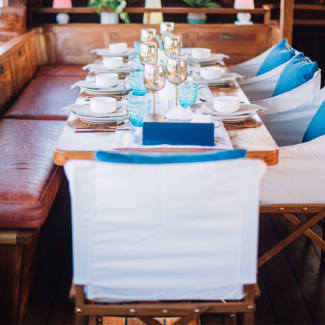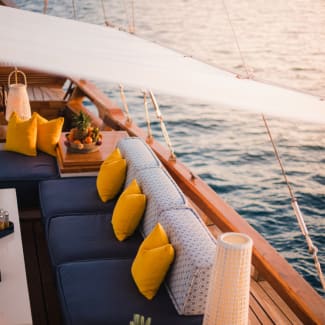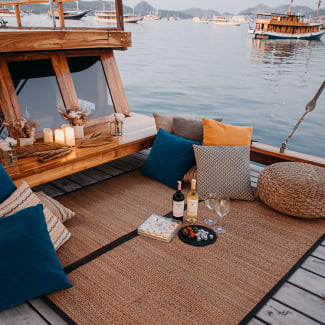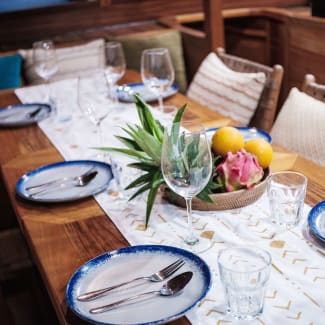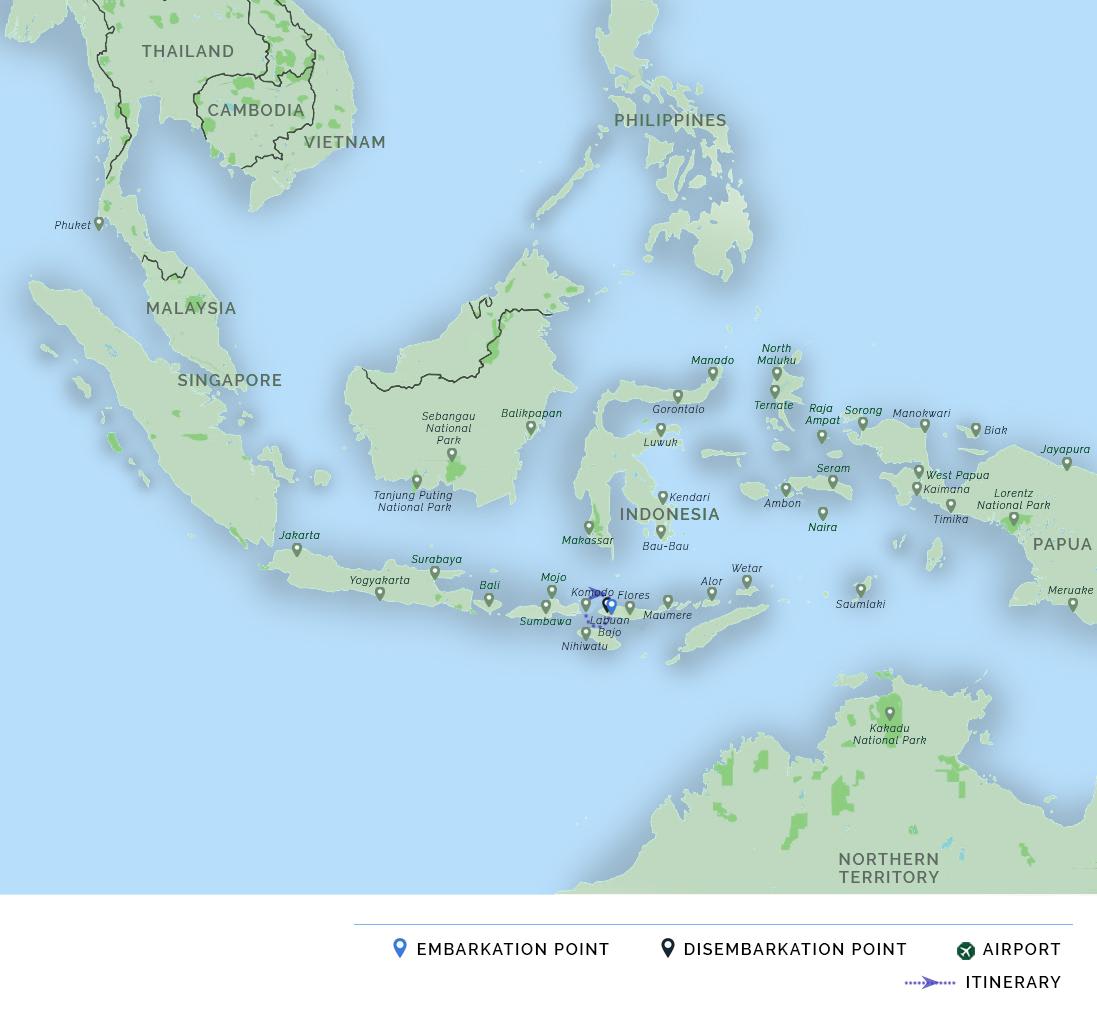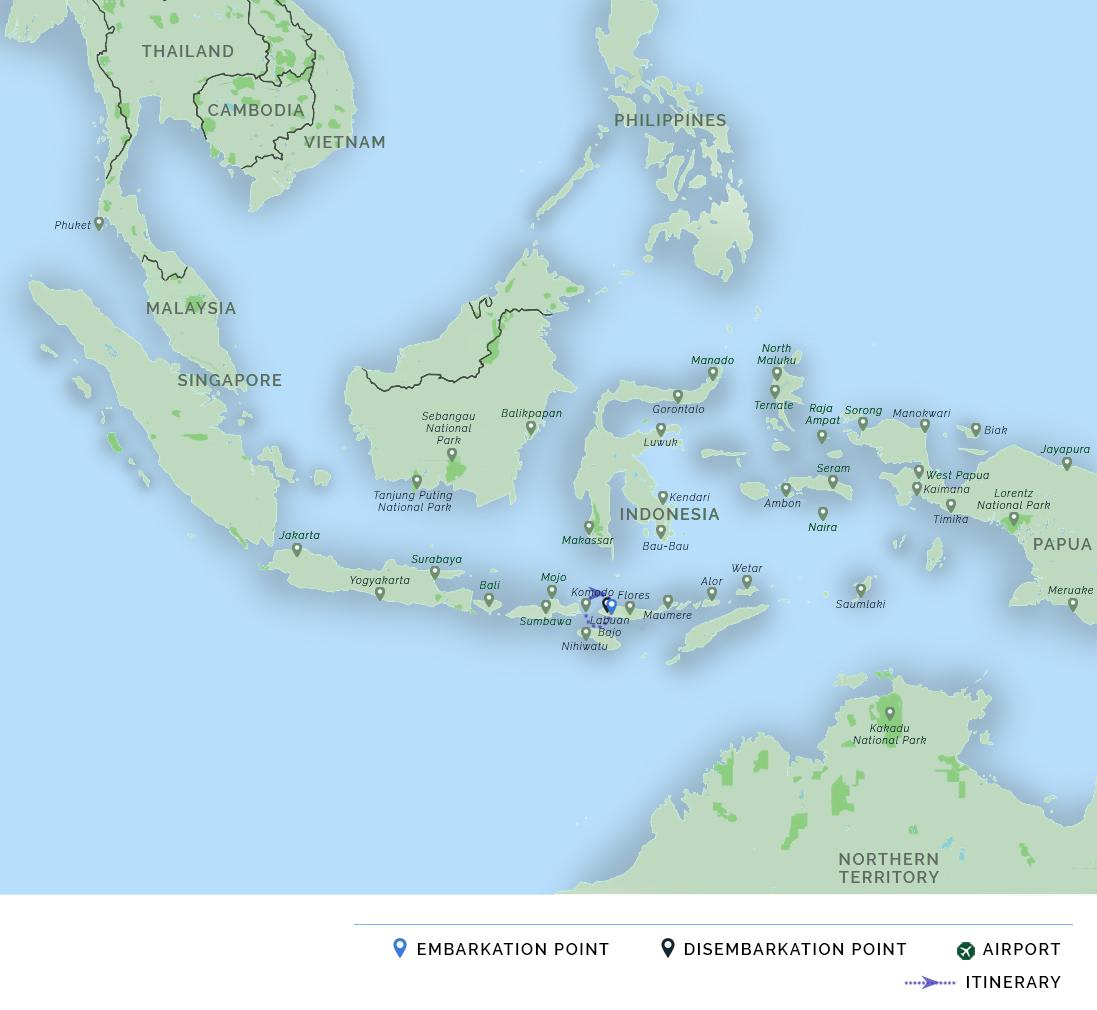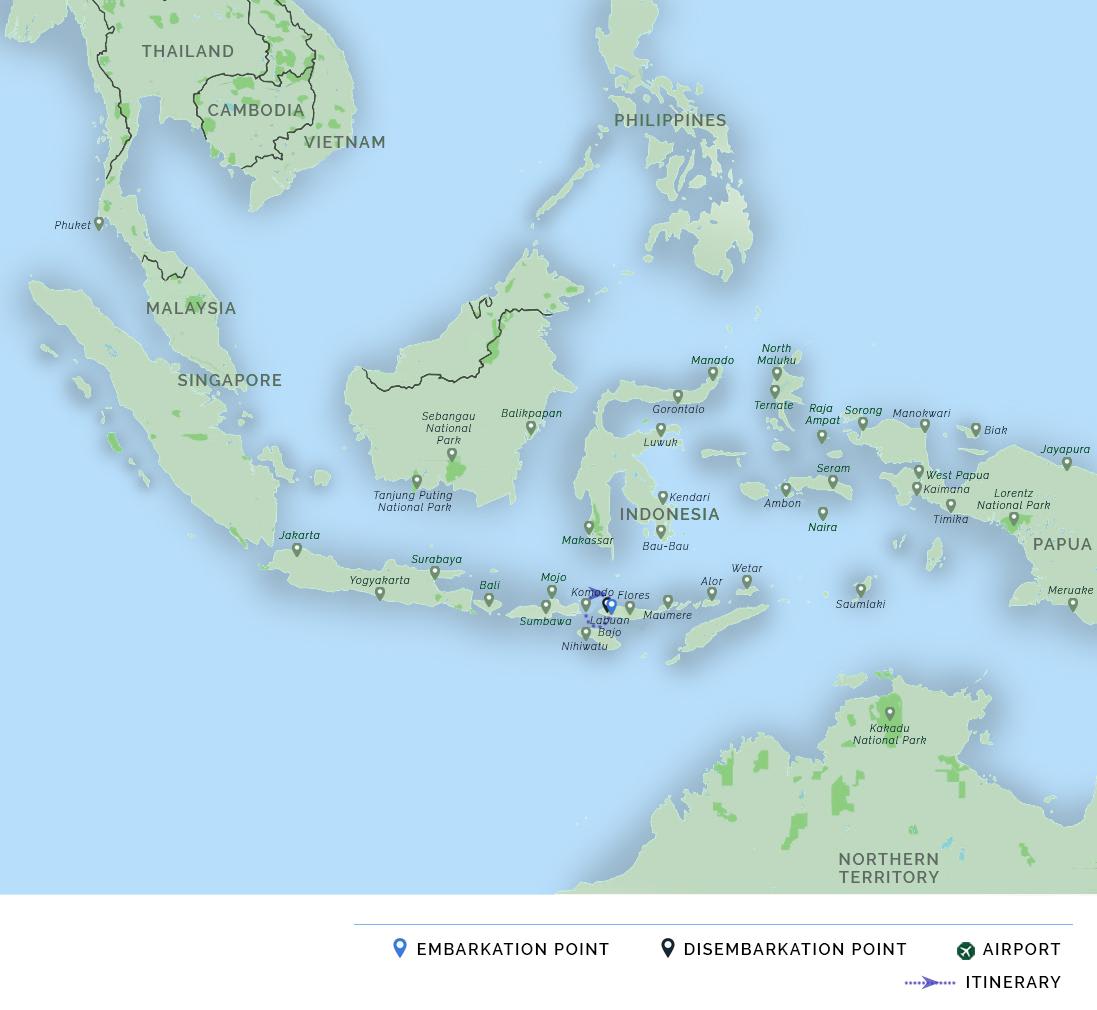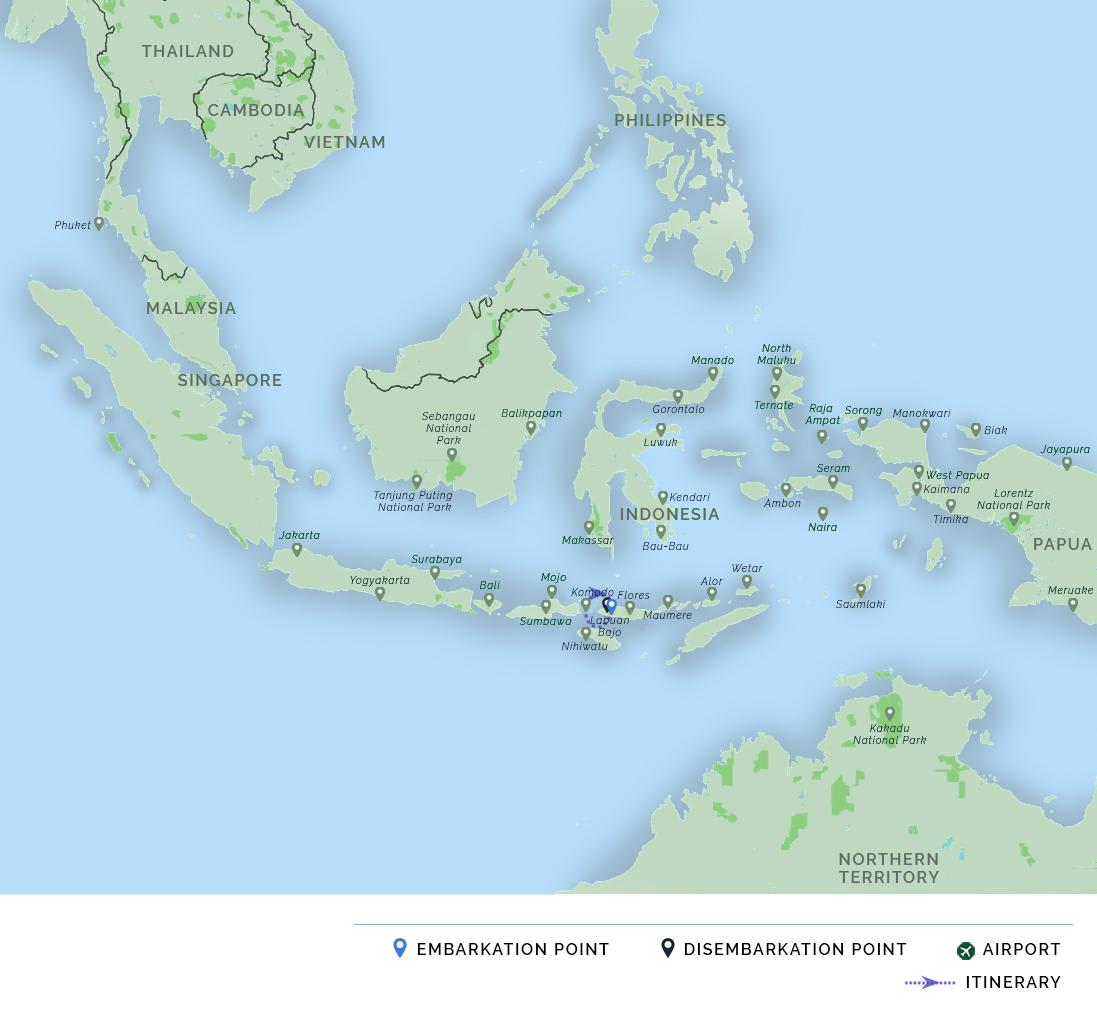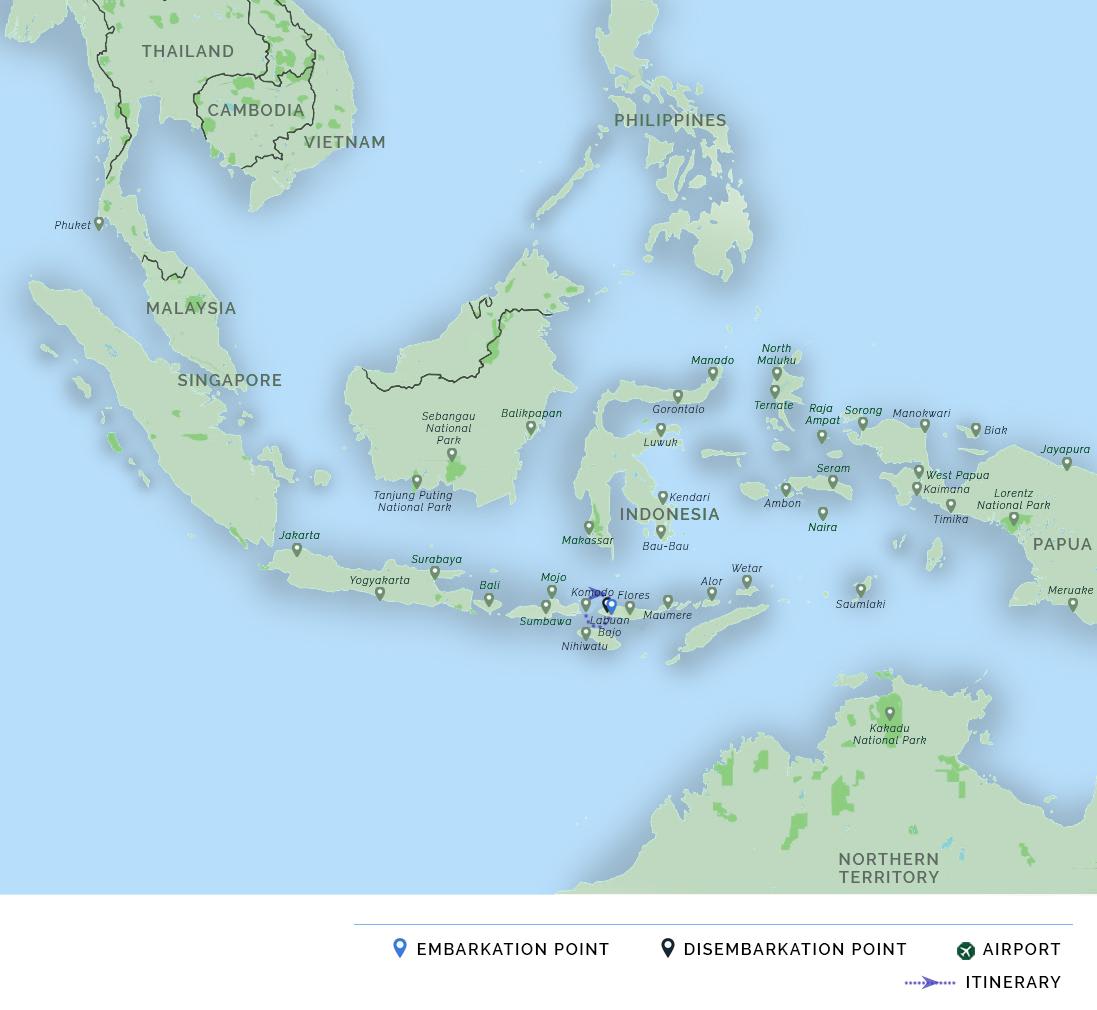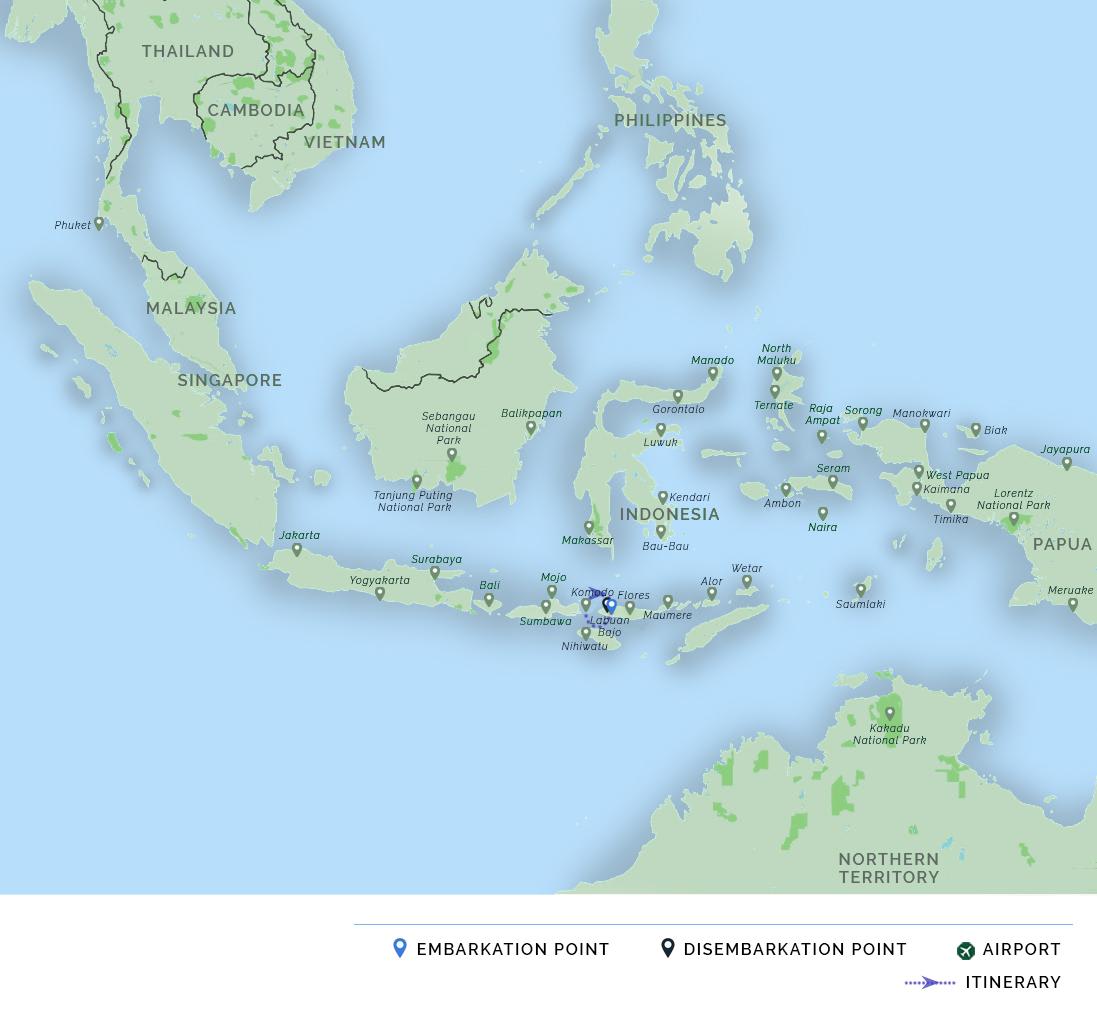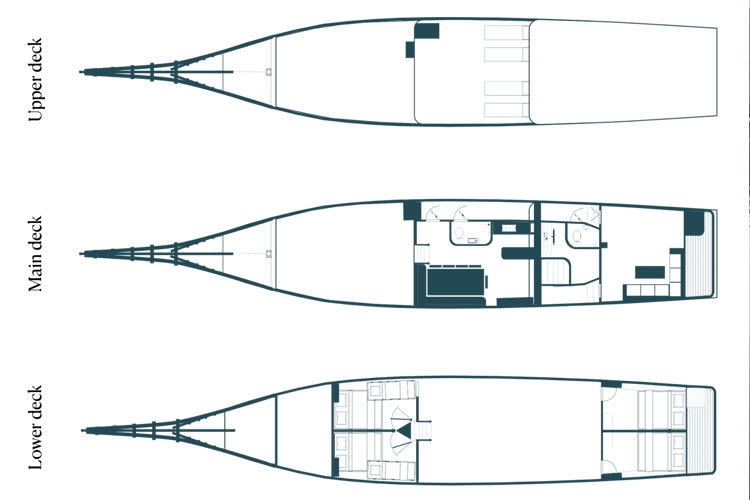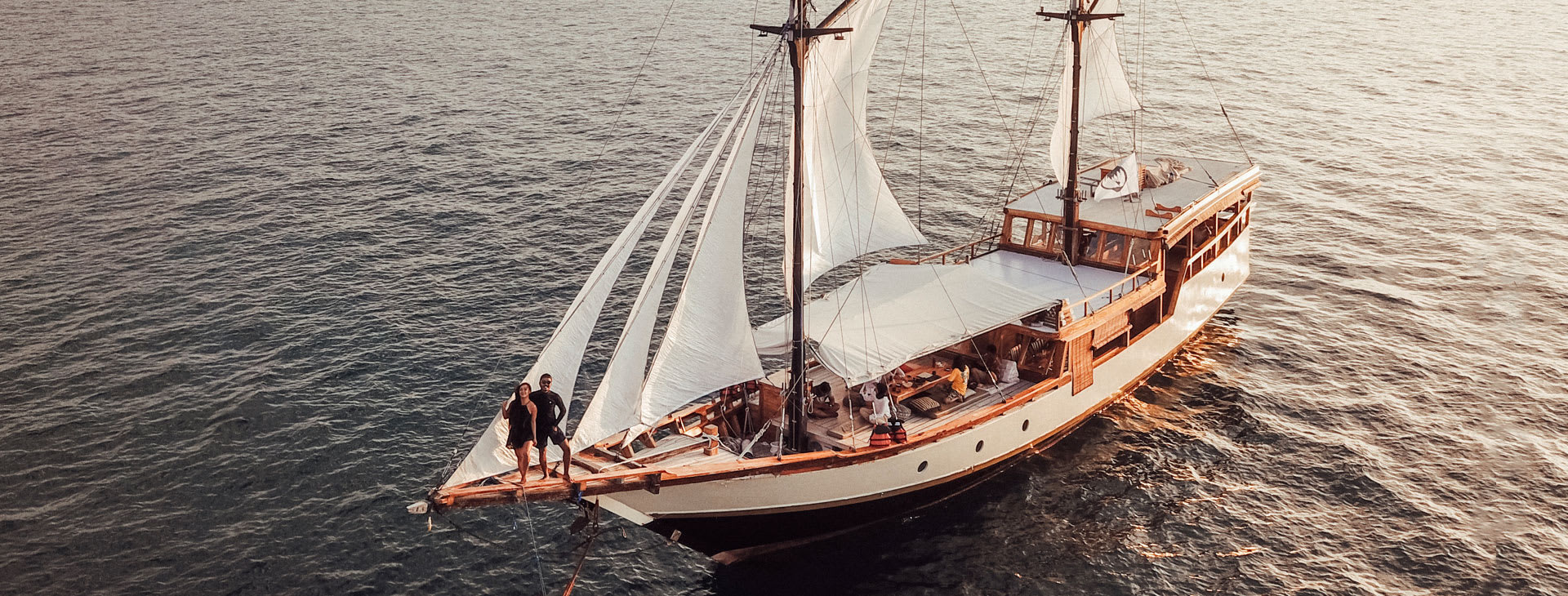
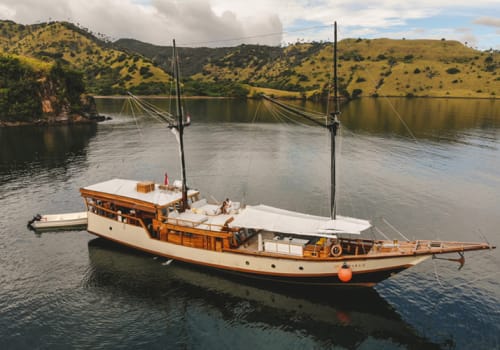
-
Adventure
-
Family
-
Honeymoon
-
Luxury
Overview
Built in 2017, the 75-foot, Samara II phinisi is a private charter liveaboard offering 3 – 6-day personalized leisure cruises through the waters of the incredible Komodo National Park. With a crew of six, catering to just ten guests on board, this beautiful wooden yacht is ideal for families and groups of friends. You can enjoy the whole boat to yourselves and determine the schedule and the destinations of your cruise.
Adventurous Activities
The attention of the crew is focused on creating truly memorable experiences, enabling you to explore the highlights of the region as well as secret beaches and hidden lagoons. As you cruise through azure seas, magnificent scenery and a panorama of islands, you will discover new wonders on a daily basis along with opportunities to encounter an extraordinary variety of wildlife including the famous Komodo dragons.
Enjoy a fine picnic on a deserted island or hike one of the savannah-clad hills for a great photo opportunity. Snorkel the kaleidoscopic beauty and colorful coral reefs of the underwater world, observe remarkable marine-life including giant manta rays at Manta Point. Stroll along the gorgeous Pink Beach, visit fishing villages, meet the sea gypsies, and witness the sight of thousands of flying foxes commuting from Kalong Island at sunset.
Life On Board
In between activities, there is ample room for rest and relaxation on board. The common areas include an open sun deck for lounging, and a shaded foredeck with a comfortable seating area, which makes for a great outdoor gathering spot and is perfect for watching the legendary Komodo sunrises and sunsets. The warm teakwood interiors of the boat draw in natural light to create a bright, fresh and relaxing ambience throughout the vessel.
The indoor lounge has a large dining table where delicious Indonesian cuisine and classic Western dishes are served; special diets can be accommodated. This dining area is open-sided, allowing you to enjoy the fabulous passing views amid the cool sea breezes. There is a bar in the aft and a Bluetooth music system for your entertainment.
On her lower deck, Samara boat presents four fully air-conditioned cabins, two of which are fitted with double beds, while the other two have double beds and single bunk beds. There are two well-appointed shared bathrooms, each with a toilet and shower. All towels and linens are provided.
About Komodo National Park
Covering around 900 square miles of sea and land, Komodo National Park is the natural habitat of the famous Komodo dragons; it is a true privilege to see them in the wild. The park is also home to over 150 species of birds.
It features a Jurassic landscape of rough hillsides lined with dry savannah and green thorny vegetation, together with perfect sandy beaches surrounded by crystal clear blue waters with amazing reefs. This is one of the world’s most biologically diverse marine environments with over 1000 species of fish.
Whether you are looking for the perfect honeymoon trip and desire the whole boat to yourselves or whether you are traveling with your family or a group of friends, Samara II offers a truly awesome way to explore Komodo.
Itineraries & Prices
All itineraries are subject to change due to seasonal weather conditions (and resultant variations in river and tributary water levels) affecting accessibility to locations. Thus navigation routes, times and excursions may need to be modified at the cruise captain’s or your guide's discretion.
Kelor Island, Pink Rock & Kalong Island
Kelor Island (trekking)
Departing from Labuan Bajo, we will cruise to the tiny uninhabited island of Kelor. This is a perfect first-stop for a short 15-minute hike to the top of the hill, where you will be rewarded with a panoramic view of Flores, Rinca Island and many other small islands within the Komodo National Park. Please note that although it is a short hike, the route is rather steep with loose scree making it a bit slippery, so be sure to wear suitable shoes or hiking sandals. Afterwards you can cool off with a refreshing swim off the white sandy beach.
Menjerite/Pink Rock (Snorkeling/trekking)
Our second destination is Menjerite/Pink Rock, great for snorkeling or trekking. Menjerite Island is distinguished by a long wooden jetty that extends over its crystal-clear waters and colorful corals, like a bridge to paradise. Trek up the hill for a stunning view of the mangrove forest and surrounding islands, or snorkel in the shallow waters around the jetty, where you’ll find thousands of reef fish and many Chocolate Chip starfish.
Kalong Island (sunset on the boat)
At the end of the day, we will moor off Kalong Island, where after what will hopefully be a magnificent sunset, you will witness hundreds of thousands of flying foxes emerging in a steady throng from the forest, reminiscent of a fleet of enemy aircraft intent on avoiding radar detection. Unlike their smaller cave-dwelling cousins, these large fruit bats hang out in camps high above the rainforest floor, keeping cool by fanning themselves with their huge wings, which can measure up to 5ft 6 inches from tip to tip. They feed on a diet of fruit and nectar from night-opening flowers, thereby playing an essential ecological role by pollinating the plants and dispersing their seeds. As darkness grows near, the fox bats become increasingly restless, leaving the roost in enormous numbers, and navigating not by echolocation but by sight and smell, to fly to a feeding site on the mainland that may be as far as 25 miles away.
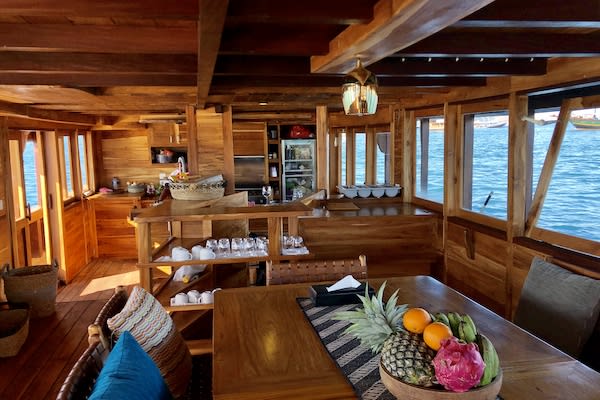
Komodo National Park
Padar Island (trekking)
Padar is the third largest island within the Komodo National Park. It offers beautiful short treks and is a hotspot for photographers. The hike to the peak takes about 20-40 minutes, and from the viewpoint you will be rewarded with a knee-jerking vista of a series of crescent-shaped bays and curved ribbons of sand.
Long Beach [Pink Beach] (beach/snorkeling)
Long Beach on Padar Island is the longest of several pink beaches in the Komodo National Park. The striking pink sand is formed by white limestone mixed with tiny particles of deep red, coral-like foraminifera. This is a beautiful beach for relaxing, swimming and snorkeling.
Loh Liang Komodo (trekking)
We will moor in Loh Liang Bay on Komodo Island, which sits against the backdrop of a jagged Jurassic landscape, a hot and dry monsoon forest surrounded by open savannah grasslands. Timor deer and wild boar dart nervously through the prickly palms; prey to the dragons that have no enemies apart from their own kind. Here, the park rangers, armed with forked sticks, will lead you inland on a choice of short, medium and long treks. At the top of Sulphurea Hill, accompanied by birdsong and chirruping cicadas, you can enjoy spectacular views of Loh Liang Bay. You will see rare orchids, butterflies, lontar palms, and maybe a screeching flock of sulphur-crested cockatoos. You might catch sight of a water buffalo at a drinking hole, a flying lizard, a jungle chicken or a pair of megapodes. Nevertheless, dragons are the objective, and you could just chance upon one sunbathing on a rock, or you might find a female, guarding her nest from marauders – which are usually other dragons. These massive scale-covered monitors with spiked claws, armour-clad bodies, snake-like heads, fierce jaws and long, yellow, forked tongues are Indonesia’s living dinosaurs, the most dangerous predatory lizards in existence. It’s a true privilege to see them in the wild.
Taka Makassar (beach/snorkeling)
Taka Makassar is the longest reef in the Komodo National Park. This tiny, emerged, crescent shaped sandbar is smaller than a football field, and surrounded by shallow turquoise waters. It is an ideal spot for relaxing, snorkeling or simply taking a dip in the sea. Exploration here is limited due to the sandbar’s minuscule size – in fact, it disappears at high tide – but it makes for great wanderlust-inducing photographs. Plentiful marine life can be seen just 30 feet from the sandbar. The location attracts large numbers of manta rays.
Manta Point (snorkeling)
Manta Point presents the opportunity to snorkel with the giant manta rays that come here to get cleaned by parasitic copepods and a variety of small cleaner wrasse species, which pick parasites from the mantas’ hovering bodies. Mantas spend many hours every day getting cleaned and can even wait in line for their turn. Reef mantas average about 10 feet in size from wingtip to wingtip, and will consume vast quantities of plankton and small fish each day by filter feeding. They are exceptionally graceful swimmers, and appear to fly through the water as they flap their large wings. The water at Manta Point is clear with good visibility, making it possible to spot the mantas with relative ease. In fact, you are almost guaranteed to see them here. Drifting on the (often strong) current with your mask and snorkel, just a few feet above one of these beautiful creatures is an experience that you will never forget.
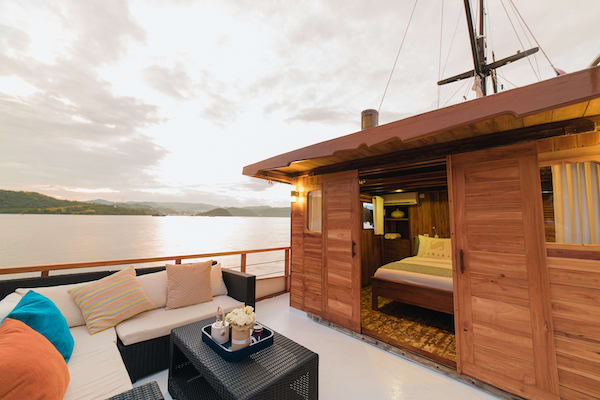
Besars & Kawana Island
Siaba Besar Island (snorkeling)
Siaba Besar Island is Komodo’s best spot for turtles. A huge population of green turtles use this hard coral covered bay as a feeding ground. Snorkel here and more often than not, you’ll see the turtles scratching on corals and rubbing their shells on sponges to keep clean.
Sebayur Besar Island (snorkeling)
Sebayur Besar Island offers fantastic snorkeling with a reef full of life, including schools of bump head parrotfish and fusiliers, leaf scorpionfish and stonefish, morays, batfish, damselfish, butterflyfish, anthias, giant spiny lobster, cuttlefish, octopus, and electric clams.
Kanawa Island (beach/snorkeling)
Kanawa Island is known for its white sand beaches and coral reefs. Another perfect place to relax and go snorkeling on the surrounding reef. Dolphins, stingrays, turtles and starfish and many other species can be seen on or nearby the reef. Kanawa is a lovely place to finish the day, admire the view of Sangeang volcano, and watch the sunset. You may even see the much-coveted green flash – a fleeting spot of intense green light an instant after sunset, caused by light refracting in the atmosphere. This is best seen when the sun sets over the ocean, when it is absolutely clear all the way to the horizon but be warned it will be gone in the blink of an eye, so don’t blink!
*** The destinations on this itinerary may be subject to change depending on requests, beach lunch/dinner set up, flight timetables, weather, dry/rainy season, sea currents, and restrictions without prior notice from the National Park.
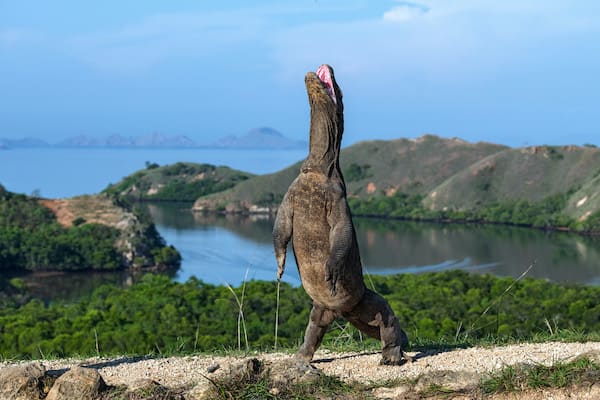
Kanawa, Sebayur & Manta Point
Kanawa Island (beach time/snorkeling)
Kanawa Island is known for its white sand beaches and coral reefs. Dolphins, stingrays, turtles and starfish and many other species can be seen on or nearby the reef. Kanawa is a lovely place to relax on the beach and admire the view of Sangeang volcano.
Sebayur Island (snorkeling)
Sebayur Besar Island offers fantastic snorkeling with a reef full of life, including schools of bump head parrotfish and fusiliers, leaf scorpionfish and stonefish, morays, batfish, damselfish, butterflyfish, anthias, giant spiny lobster, cuttlefish, octopus, and electric clams.
Manta Point (snorkeling)
Manta Point presents the opportunity to snorkel with the giant manta rays that come here to get cleaned by parasitic copepods and a variety of small cleaner wrasse species, which pick parasites from the mantas’ hovering bodies. Mantas spend many hours every day getting cleaned and can even wait in line for their turn. Reef mantas average about 10 feet in size from wingtip to wingtip, and will consume vast quantities of plankton and small fish each day by filter feeding. They are exceptionally graceful swimmers, and appear to fly through the water as they flap their large wings. The water at Manta Point is clear with good visibility, making it possible to spot the mantas with relative ease. In fact, you are almost guaranteed to see them here. Drifting on the (often strong) current with your mask and snorkel, just a few feet above one of these beautiful creatures is an experience that you will never forget.
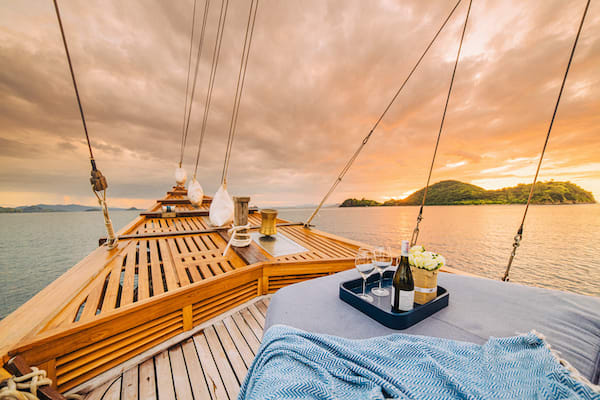
Taka Makassar, Loh Liang Komodo & Batu Bilah Island
Taka Makassar (beach time/snorkeling)
Taka Makassar is the longest reef in the Komodo National Park. This tiny, emerged, crescent-shaped sandbar is smaller than a football field, and surrounded by shallow turquoise waters. It is an ideal spot for relaxing, snorkeling or simply taking a dip in the sea. Exploration here is limited due to the sandbar’s minuscule size – in fact, it disappears at high tide – but it makes for great wanderlust-inducing photographs. Plentiful marine life can be seen just 30 feet from the sandbar. The location attracts large numbers of manta rays.
Loh Liang Komodo (trekking)
We will moor in Loh Liang Bay on Komodo Island, which sits against the backdrop of a jagged Jurassic landscape, a hot and dry monsoon forest surrounded by open savannah grasslands. Timor deer and wild boar dart nervously through the prickly palms; prey to the dragons that have no enemies apart from their own kind. Here, the park rangers, armed with forked sticks, will lead you inland on a choice of short, medium and long treks. At the top of Sulphurea Hill, accompanied by birdsong and chirruping cicadas, you can enjoy spectacular views of Loh Liang Bay. You will see rare orchids, butterflies, lontar palms, and maybe a screeching flock of sulphur-crested cockatoos. You might catch sight of a water buffalo at a drinking hole, a flying lizard, a jungle chicken or a pair of megapodes. Nevertheless, dragons are the objective, and you could just chance upon one sunbathing on a rock, or you might find a female, guarding her nest from marauders – which are usually other dragons. These massive scale-covered monitors with spiked claws, armour-clad bodies, snake-like heads, fierce jaws and long, yellow, forked tongues are Indonesia’s living dinosaurs, the most dangerous predatory lizards in existence. It’s a true privilege to see them in the wild.
Long Beach [Pink Beach] (beach/snorkeling)
Long Beach on Padar Island is the longest of several pink beaches in the Komodo National Park. The striking pink sand is formed by white limestone mixed with tiny particles of deep red, coral-like foraminifera. This is a beautiful beach for relaxing, swimming and snorkeling.
Batu Bilah Island (sunset & dinner set up)
In the late afternoon, we will go ashore to Batu Bilah, a small, deserted islet that gets its name from a pillar of rock that forms an archway. While you relax and enjoy what will hopefully be a glorious sunset, our crew will prepare a very special beach barbecue dinner. Sit back with your feet in the sand, gaze up at the stars rising in the immense Indonesian sky, relish the delicious food, and sing and dance at the water’s edge.
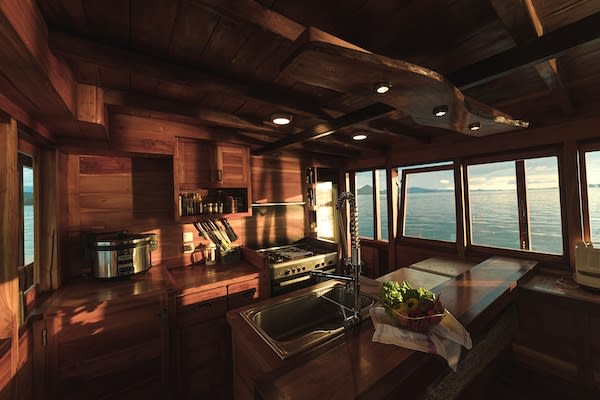
Padar, Siaba & Kalong
Padar Island (trekking)
Padar is the third largest island within the Komodo National Park. It offers beautiful short treks and is a hotspot for photographers. The hike to the peak takes about 20-40 minutes, and from the viewpoint you will be rewarded with a knee-jerking vista of a series of crescent shaped bays and curved ribbons of sand.
Siaba Island (snorkeling)
Siaba Besar Island is Komodo’s best spot for turtles. A huge population of green turtles use this hard coral covered bay as a feeding ground. Snorkel here and more often than not, you’ll see the turtles scratching on corals and rubbing their shells on sponges to keep clean.
Kalong Island (sunset on the boat)
At the end of the day, we will moor off Kalong Island, where after what will hopefully be a magnificent sunset, you will witness hundreds of thousands of flying foxes emerging in a steady throng from the forest, reminiscent of a fleet of enemy aircraft intent on avoiding radar detection. Unlike their smaller cave-dwelling cousins, these large fruit bats hang out in camps high above the rainforest floor, keeping cool by fanning themselves with their huge wings, which can measure up to 5ft 6 inches from tip to tip. They feed on a diet of fruit and nectar from night-opening flowers, thereby playing an essential ecological role by pollinating the plants and dispersing their seeds. As darkness grows near, the fox bats become increasingly restless, leaving the roost in enormous numbers, and navigating not by echolocation but by sight and smell, to fly to a feeding site on the mainland that may be as far as 25 miles away.
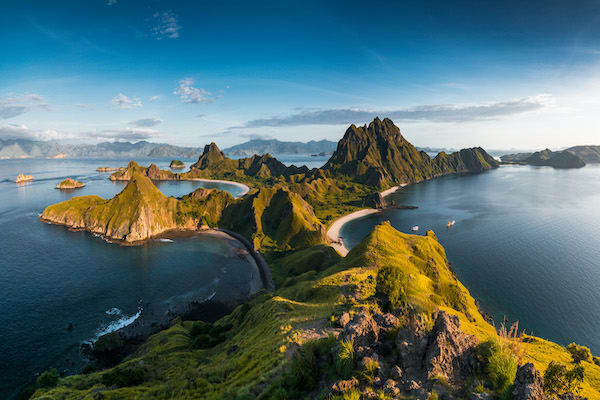
Kelor & Bidadari
Kelor Island (trekking)
On the tiny uninhabited island of Kelor, you can take a short 15-minute hike to the top of the hill, where you will be rewarded with a panoramic view of Flores, Rinca Island and many other small islands within the Komodo National Park. Please note that although it is a short hike, the route is rather steep with loose scree making it a bit slippery, so be sure to wear suitable shoes or hiking sandals. Afterwards you can cool off with a refreshing swim off the white sandy beach.
Bidadari Island (beach time)
Bidadari (Angel) Island has three beaches and is surrounded by clear waters and a coral reef, which has been given a protected status, allowing the reef and marine life to thrive. The island is a haven for birds, butterflies and insects. Woodpeckers, kingfishers, sunbirds, Flores white eyes, megapodes, and sea eagles are all seen on a regular basis. The reef is home to spectacular soft and hard corals, seahorses, pufferfish, snake eels, moray eels, cuttlefish, nudibranch, pipefish and much, much more. Relax on the white sandy beach and you might be lucky enough to see a passing pod of dolphins or a jumping sailfish, look for baby reef sharks in the shallows and stingrays in the late afternoon.
*** The destinations on this itinerary may be subject to change depending on requests, beach lunch/dinner set up, flight timetables, weather, dry/rainy season, sea currents, and restrictions without prior notice from the National Park.
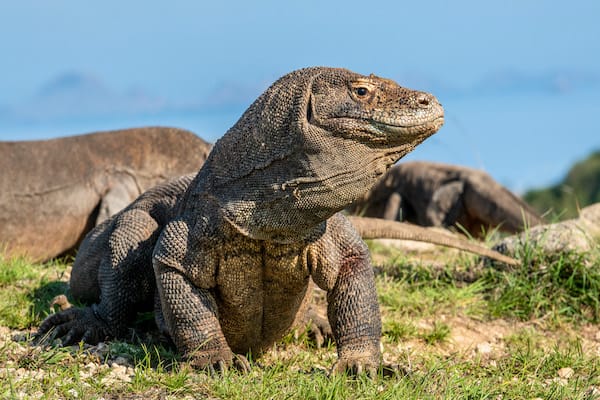
Kawana, Sebayur & Gili Lawa Darat
Kanawa Island (beach time/snorkeling)
Kanawa Island is known for its white sand beaches and coral reefs. Dolphins, stingrays, turtles and starfish and many other species can be seen on or nearby the reef. Kanawa is a lovely place to relax on the beach and admire the view of Sangeang volcano
Sebayur Besar Island (snorkeling)
Sebayur Besar Island offers fantastic snorkeling with a reef full of life, including schools of bump head parrotfish and fusiliers, leaf scorpionfish and stonefish, morays, batfish, damselfish, butterflyfish, anthias, giant spiny lobster, cuttlefish, octopus, and electric clams.
Gili Lawa Darat (beach/snorkeling)
Gili Lawa Darat is the northernmost island in Komodo National Park. Here, you can spend the afternoon snorkeling and swimming in the tranquil, almost circular bay, a natural harbor. Hang out on the crescent-shaped beach and keep your eyes peeled for white-collared kingfishers on the shoreline, or Brahminy kites (also known as red-backed or white-headed sea eagles) soaring in the sky above. Behind you is a peak, 750 ft above sea level, it’s a 20-to-30-minute hike to the top where the horizon opens up to a complete vista overlooking all 80 islands within the Komodo Archipelago and the mainland of Flores. The ideal time to do this is at sunset. The sight of the long white sandy beaches with clearly visible coral formations, the savannah-like landscape of Komodo Island and volcanic island silhouettes in the background is a unique photo opportunity and will become a cherished memory.
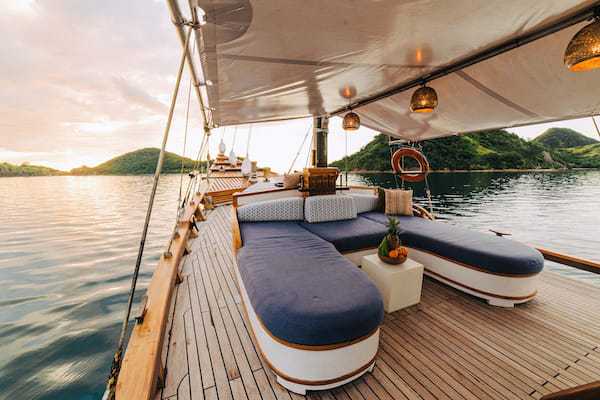
Gili Lawa Darat & Laut, Taka Makassar & Manta Point
Gili Lawa Darat & Laut (snorkeling)
Gili Lawa Darat is so beautiful that you’ll appreciate the additional time that you’ll be spending here. The island faces the wide and deep bay of Komodo Island and is known as the “island close to the land.” It is well protected from strong winds and waves, making it a perfect bay for snorkeling; sea turtles and manta rays are commonly seen here. Some even refer to the island as the Komodo’s fjord, as attributed to its geological position. The neighboring sister-island of Gili Lawa Laut promises an equally breathtaking viewpoint and you can trek to the peak in about 30 minutes. Snorkeling is also sublime here.
Crystal Rock (snorkeling)
Located in the north of the Park, Crystal Rock is one of Komodo’s gems, named for its crystal-clear waters. Here, a rocky pinnacle breaks the surface at low tide, displaying an array of colorful soft and hard corals. In addition to the reef life, you may get to see trevally, jacks, sharks, mackerel, Napoleon wrasse, tuna and even the occasional eagle ray.
Taka Makassar (beach time/snorkeling)
Taka Makassar is the longest reef in the Komodo National Park. This tiny, emerged, crescent shaped sandbar is smaller than a football field, and surrounded by shallow turquoise waters. It is an ideal spot for relaxing, snorkeling or simply taking a dip in the sea. Exploration here is limited due to the sandbar’s minuscule size – in fact, it disappears at high tide – but it makes for great wanderlust-inducing photographs. Plentiful marine life can be seen just 30 feet from the sandbar. The location attracts large numbers of manta rays.
Manta Point (snorkeling)
Manta Point presents the opportunity to snorkel with the giant manta rays that come here to get cleaned by parasitic copepods and a variety of small cleaner wrasse species, which pick parasites from the mantas’ hovering bodies. Mantas spend many hours every day getting cleaned and can even wait in line for their turn. Reef mantas average about 10 feet in size from wingtip to wingtip, and will consume vast quantities of plankton and small fish each day by filter feeding. They are exceptionally graceful swimmers, and appear to fly through the water as they flap their large wings. The water at Manta Point is clear with good visibility, making it possible to spot the mantas with relative ease. In fact, you are almost guaranteed to see them here. Drifting on the (often strong) current with your mask and snorkel, just a few feet above one of these beautiful creatures is an experience that you will never forget.
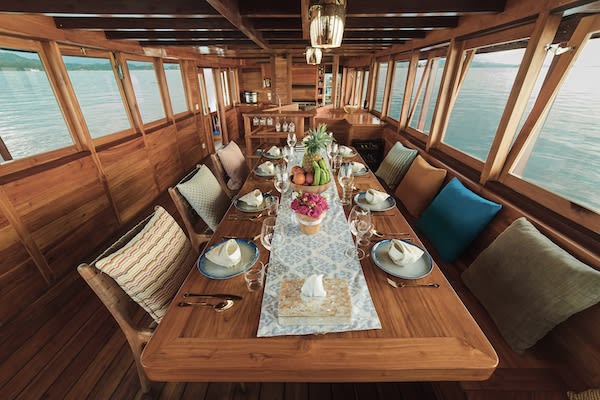
Komodo National Park
Loh Liang Komodo (trekking)
We will moor in Loh Liang Bay on Komodo Island, which sits against the backdrop of a jagged Jurassic landscape, a hot and dry monsoon forest surrounded by open savannah grasslands. Timor deer and wild boar dart nervously through the prickly palms; prey to the dragons that have no enemies apart from their own kind. Here, the park rangers, armed with forked sticks, will lead you inland on a choice of short, medium and long treks. At the top of Sulphurea Hill, accompanied by birdsong and chirruping cicadas, you can enjoy spectacular views of Loh Liang Bay. You will see rare orchids, butterflies, lontar palms, and maybe a screeching flock of sulphur-crested cockatoos. You might catch sight of a water buffalo at a drinking hole, a flying lizard, a jungle chicken or a pair of megapodes. Nevertheless, dragons are the objective, and you could just chance upon one sunbathing on a rock, or you might find a female, guarding her nest from marauders – which are usually other dragons. These massive scale-covered monitors with spiked claws, armour-clad bodies, snake-like heads, fierce jaws and long, yellow, forked tongues are Indonesia’s living dinosaurs, the most dangerous predatory lizards in existence. It’s a true privilege to see them in the wild.
Long Beach [Pink Beach] (beach/snorkeling)
Long Beach on Padar Island is the longest of several pink beaches in the Komodo National Park. The striking pink sand is formed by white limestone mixed with tiny particles of deep red, coral-like foraminifera. This is a beautiful beach for relaxing, swimming and snorkeling.
Batu Bilah Island (sunset & dinner set up)
In the late afternoon, we will go ashore to Batu Bilah, a small, deserted islet that gets its name from a pillar of rock that forms an archway. While you relax and enjoy what will hopefully be a glorious sunset, our crew will prepare a very special beach barbecue dinner. Sit back with your feet in the sand, gaze up at the stars rising in the immense Indonesian sky, relish the delicious food, and sing and dance at the water’s edge.
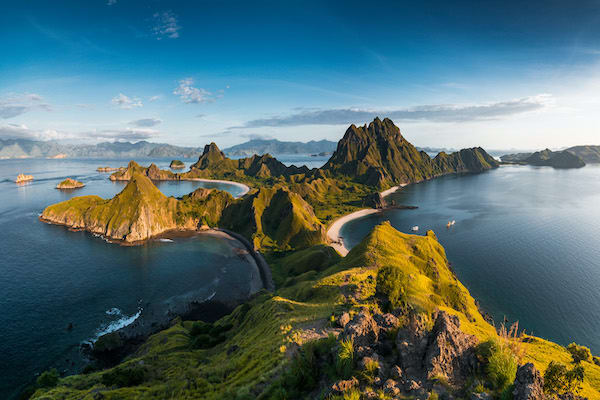
Padar, Siaba Besar & Kalong
Padar Island (trekking)
Padar is the third largest island within the Komodo National Park. It offers beautiful short treks and is a hotspot for photographers. The hike to the peak takes about 20-40 minutes, and from the viewpoint you will be rewarded with a knee-jerking vista of a series of crescent shaped bays and curved ribbons of sand.
Siaba Besar Island (snorkeling)
Siaba Besar Island is Komodo’s best spot for turtles. A huge population of green turtles use this hard coral covered bay as a feeding ground. Snorkel here and more often than not, you’ll see the turtles scratching on corals and rubbing their shells on sponges to keep clean.
Kalong Island (sunset on the boat)
At the end of the day, we will moor off Kalong Island, where after what will hopefully be a magnificent sunset, you will witness hundreds of thousands of flying foxes emerging in a steady throng from the forest, reminiscent of a fleet of enemy aircraft intent on avoiding radar detection. Unlike their smaller cave-dwelling cousins, these large fruit bats hang out in camps high above the rainforest floor, keeping cool by fanning themselves with their huge wings, which can measure up to 5ft 6 inches from tip to tip. They feed on a diet of fruit and nectar from night-opening flowers, thereby playing an essential ecological role by pollinating the plants and dispersing their seeds. As darkness grows near, the fox bats become increasingly restless, leaving the roost in enormous numbers, and navigating not by echolocation but by sight and smell, to fly to a feeding site on the mainland that may be as far as 25 miles away.
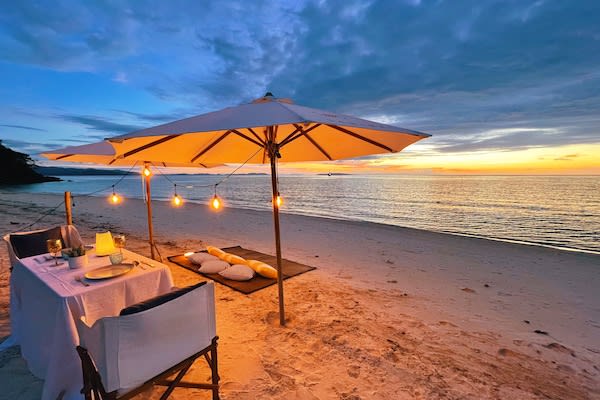
Kelor & Bidadari
Kelor Island (trekking)
On the tiny uninhabited island of Kelor, you can take a short 15-minute hike to the top of the hill, where you will be rewarded with a panoramic view of Flores, Rinca Island and many other small islands within the Komodo National Park. Please note that although it is a short hike, the route is rather steep with loose scree making it a bit slippery, so be sure to wear suitable shoes or hiking sandals. Afterwards you can cool off with a refreshing swim off the white sandy beach.
Bidadari Island (beach time)
Bidadari (Angel) Island has three beaches and is surrounded by clear waters and a coral reef, which has been given a protected status, allowing the reef and marine life to thrive. The island is a haven for birds, butterflies and insects. Woodpeckers, kingfishers, sunbirds, Flores white eyes, megapodes, and sea eagles are all seen on a regular basis. The reef is home to spectacular soft and hard corals, seahorses, pufferfish, snake eels, moray eels, cuttlefish, nudibranch, pipefish and much, much more. Relax on the white sandy beach and you might be lucky enough to see a passing pod of dolphins or a jumping sailfish, look for baby reef sharks in the shallows and stingrays in the late afternoon.
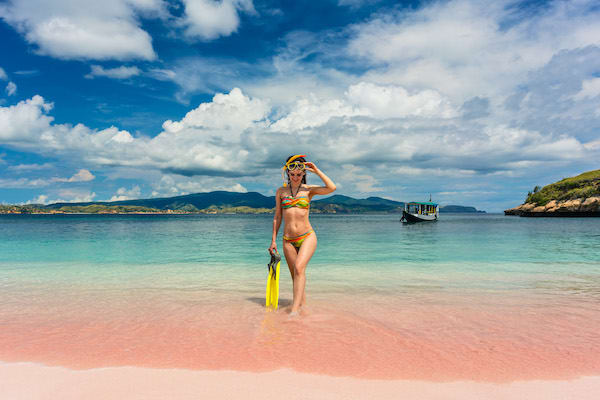
Kelor Island, Pink Rock & Kalong Island
Kelor Island (trekking)
Departing from Labuan Bajo, we will cruise to the tiny uninhabited island of Kelor. This is a perfect first-stop for a short 15-minute hike to the top of the hill, where you will be rewarded with a panoramic view of Flores, Rinca Island and many other small islands within the Komodo National Park. Please note that although it is a short hike, the route is rather steep with loose scree making it a bit slippery, so be sure to wear suitable shoes or hiking sandals. Afterwards you can cool off with a refreshing swim off the white sandy beach.
Menjerite/Pink Rock (Snorkeling/trekking)
Our second destination is Menjerite/Pink Rock, great for snorkeling or trekking. Menjerite Island is distinguished by a long wooden jetty that extends over its crystal-clear waters and colorful corals, like a bridge to paradise. Trek up the hill for a stunning view of the mangrove forest and surrounding islands, or snorkel in the shallow waters around the jetty, where you’ll find thousands of reef fish and many Chocolate Chip starfish (aka the nodular sea star).
Kalong Island (sunset on the boat)
At the end of the day, we will moor off Kalong Island, where after what will hopefully be a magnificent sunset, you will witness hundreds of thousands of flying foxes emerging in a steady throng from the forest, reminiscent of a fleet of enemy aircraft intent on avoiding radar detection. Unlike their smaller cave-dwelling cousins, these large fruit bats hang out in camps high above the rainforest floor, keeping cool by fanning themselves with their huge wings, which can measure up to 5ft 6 inches from tip to tip. They feed on a diet of fruit and nectar from night-opening flowers, thereby playing an essential ecological role by pollinating the plants and dispersing their seeds. As darkness grows near, the fox bats become increasingly restless, leaving the roost in enormous numbers, and navigating not by echolocation but by sight and smell, to fly to a feeding site on the mainland that may be as far as 25 miles away.
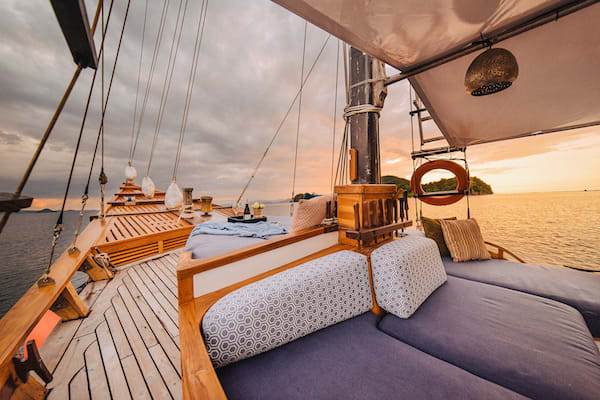
Muang Island, Gili Motang & Nusa Kode
Muang island (beach time)
Today, we’ll visit some of the remotest and least visited parts of Komodo National Park, in the east. We’ll start with the tiny uninhabited island of Muang, located between Rinca and Flores, for some beach time. This is a protected area and a turtle nesting place with a white sand beach, where you can relax. You won’t see any turtles coming ashore during the daytime, but you may find some turtle tracks in the sand. Keep your eyes peeled for Brahminy kites soaring overhead and white breasted sea eagles.
Gili Motang (snorkeling)
Located east of Rinca Island and distinguished by some large offshore satellite rocks and pristine reefs, Gili Motang offers beautiful scenery and some great snorkeling in the shallow waters. The island is home to a small population of about 100 Komodo dragons so keep your eyes open, even though you’re unlikely to see them and there is no park ranger station here.
Nusa Kode (snorkeling)
We’ll finish the day snorkeling off Nusa Kode, which is an island to the south of Rinca. In fact, from here, you may even witness some Komodo dragons rambling along Rinca’s seashore. The southwestern tip of Nusa Kode island is characterized by large, coral-encrusted boulders and among these are some of the largest reef fish residing in the Park such as gigantic potato cod and Malabar groupers as well as schools of large red snapper.
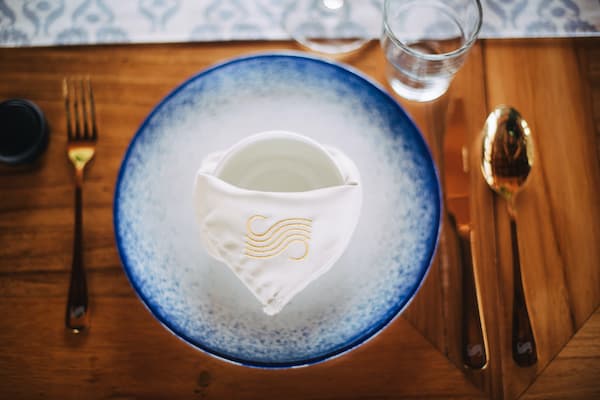
Padar, Batu Bilah Island
Nusa Kode (snorkeling)
The marine life around Nusa Kode is so abundant that you’ll appreciate the additional time we’ve allocated to snorkeling here in the far reaches of the National Park. The southwestern tip of Nusa Kode island is characterized by large, coral-encrusted boulders and among these are some of the largest reef fish residing in the Park such as gigantic potato cod and Malabar groupers as well as schools of large red snapper.
Padar Island (trekking)
Padar is the third largest island within the Komodo National Park. It offers beautiful short treks and is a hotspot for photographers. The hike to the peak takes about 20-40 minutes, and from the viewpoint you will be rewarded with a knee-jerking vista of a series of crescent shaped bays and curved ribbons of sand.
Batu Bilah Island (sunset & dinner set up)
In the late afternoon, we will go ashore to Batu Bilah, a small, deserted islet that gets its name from a pillar of rock that forms an archway. While you relax and enjoy what will hopefully be a glorious sunset, our crew will prepare a very special beach barbecue dinner. Sit back with your feet in the sand, gaze up at the stars rising in the immense Indonesian sky, relish the delicious food, and sing and dance at the water’s edge.
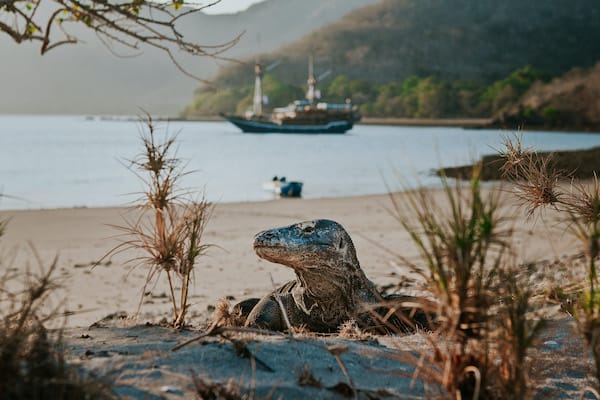
Komodo National Park
Long Beach [Pink Beach] (beach/snorkeling)
Long Beach on Padar Island is the longest of several pink beaches in the Komodo National Park. The striking pink sand is formed by white limestone mixed with tiny particles of deep red, coral-like foraminifera. This is a beautiful beach for relaxing, swimming and snorkeling.
Loh Liang Komodo (trekking)
We will moor in Loh Liang Bay on Komodo Island, which sits against the backdrop of a jagged Jurassic landscape, a hot and dry monsoon forest surrounded by open savannah grasslands. Timor deer and wild boar dart nervously through the prickly palms; prey to the dragons that have no enemies apart from their own kind. Here, the park rangers, armed with forked sticks, will lead you inland on a choice of short, medium and long treks. At the top of Sulphurea Hill, accompanied by birdsong and chirruping cicadas, you can enjoy spectacular views of Loh Liang Bay. You will see rare orchids, butterflies, lontar palms, and maybe a screeching flock of sulphur-crested cockatoos. You might catch sight of a water buffalo at a drinking hole, a flying lizard, a jungle chicken or a pair of megapodes. Nevertheless, dragons are the objective, and you could just chance upon one sunbathing on a rock, or you might find a female, guarding her nest from marauders – which are usually other dragons. These massive scale-covered monitors with spiked claws, armour-clad bodies, snake-like heads, fierce jaws and long, yellow, forked tongues are Indonesia’s living dinosaurs, the most dangerous predatory lizards in existence. It’s a true privilege to see them in the wild.
Taka Makassar (beach time/snorkeling)
Taka Makassar is the longest reef in the Komodo National Park. This tiny, emerged, crescent shaped sandbar is smaller than a football field, and surrounded by shallow turquoise waters. It is an ideal spot for relaxing, snorkeling or simply taking a dip in the sea. Exploration here is limited due to the sandbar’s minuscule size – in fact, it disappears at high tide – but it makes for great wanderlust-inducing photographs. Plentiful marine life can be seen just 30 feet from the sandbar. The location attracts large numbers of manta rays.
Manta Point (snorkeling)
Manta Point presents the opportunity to snorkel with the giant manta rays that come here to get cleaned by parasitic copepods and a variety of small cleaner wrasse species, which pick parasites from the mantas’ hovering bodies. Mantas spend many hours every day getting cleaned and can even wait in line for their turn. Reef mantas average about 10 feet in size from wingtip to wingtip, and will consume vast quantities of plankton and small fish each day by filter feeding. They are exceptionally graceful swimmers, and appear to fly through the water as they flap their large wings. The water at Manta Point is clear with good visibility, making it possible to spot the mantas with relative ease. In fact, you are almost guaranteed to see them here. Drifting on the (often strong) current with your mask and snorkel, just a few feet above one of these beautiful creatures is an experience that you will never forget.
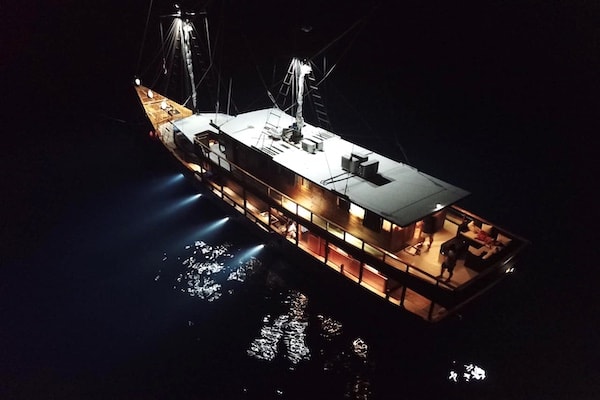
Gili Lawa Darat & Crystal Rock
Gili Lawa Darat (sunset & overnight)
Gili Lawa Darat is the northernmost island in Komodo National Park. Here, you can spend the afternoon snorkeling and swimming in the tranquil, almost circular bay, a natural harbor. Hang out on the crescent-shaped beach and keep your eyes peeled for white-collared kingfishers on the shoreline, or Brahminy kites (also known as red-backed or white-headed sea eagles) soaring in the sky above. Behind you is a peak, 750 ft above sea level, it’s a 20-to-30-minute hike to the top where the horizon opens up to a complete vista overlooking all 80 islands within the Komodo Archipelago and the mainland of Flores. The ideal time to do this is at sunset or sunrise, and if you wish, you will have the opportunity to do both. The sight of the long white sandy beaches with clearly visible coral formations, the savannah-like landscape of Komodo Island and volcanic island silhouettes in the background is a unique photo opportunity and will become a cherished memory.
Crystal Rock (snorkeling)
Located in the north of the Park, Crystal Rock is one of Komodo’s gems, named for its crystal-clear waters. Here, a rocky pinnacle breaks the surface at low tide, displaying an array of colorful soft and hard corals. In addition to the reef life, you may get to see trevally, jacks, sharks, mackerel, Napoleon wrasse, tuna and even the occasional eagle ray.
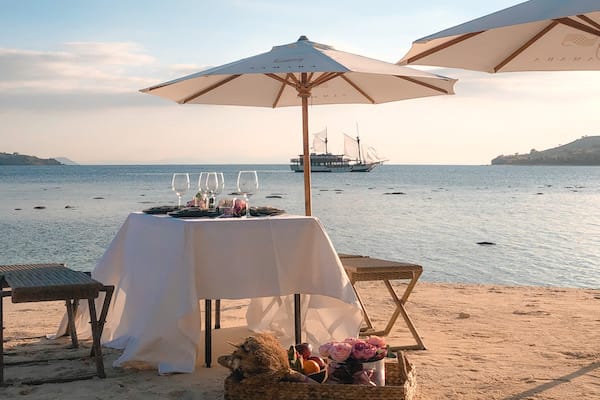
Sebayur Besar & Kawana Islands
Sebayur Besar Island (snorkeling)
Sebayur Besar Island offers fantastic snorkeling with a reef full of life, including schools of bump head parrotfish and fusiliers, leaf scorpionfish and stonefish, morays, batfish, damselfish, butterflyfish, anthias, giant spiny lobster, cuttlefish, octopus, and electric clams.
Kanawa Island (beach time/snorkeling)
Kanawa Island is known for its white sand beaches and coral reefs. Dolphins, stingrays, turtles and starfish, anemones, clown fishes and many other species can be seen on or nearby the reef. If you snorkel under the jetty, you may spot the resident lionfish; these guys are incredible to look at but be sure to stay clear of their venomous spines. You may also see a few baby black-tip sharks swimming close to the shore. Kanawa is a lovely place to finish the day, admire the view of Sangeang volcano, and watch the sunset. You may even see the much-coveted green flash – a fleeting spot of intense green light an instant after sunset, caused by light refracting in the atmosphere. This is best seen when the sun sets over the ocean, when it is absolutely clear all the way to the horizon but be warned it will be gone in the blink of an eye, so don’t blink!
*** The destinations on this itinerary may be subject to change depending on requests, beach lunch/dinner set up, flight timetables, weather, dry/rainy season, sea currents, and restrictions without prior notice from the National Park.
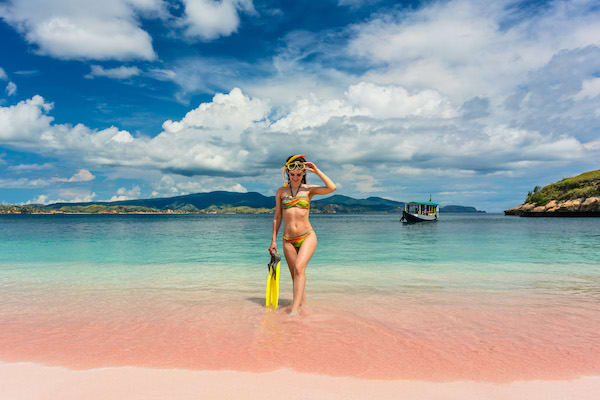
Kelor Island, Pink Rock & Kalong Island
Kelor Island (trekking)
Departing from Labuan Bajo, we will cruise to the tiny uninhabited island of Kelor. This is a perfect first-stop for a short 15-minute hike to the top of the hill, where you will be rewarded with a panoramic view of Flores, Rinca Island and many other small islands within the Komodo National Park. Please note that although it is a short hike, the route is rather steep with loose scree making it a bit slippery, so be sure to wear suitable shoes or hiking sandals. Afterwards you can cool off with a refreshing swim off the white sandy beach.
Menjerite/Pink Rock (Snorkeling/trekking)
Our second destination is Menjerite/Pink Rock, great for snorkeling or trekking. Menjerite Island is distinguished by a long wooden jetty that extends over its crystal-clear waters and colorful corals, like a bridge to paradise. Trek up the hill for a stunning view of the mangrove forest and surrounding islands, or snorkel in the shallow waters around the jetty, where you’ll find thousands of reef fish and many Chocolate Chip starfish.
Kalong Island (sunset on the boat)
At the end of the day, we will moor off Kalong Island, where after what will hopefully be a magnificent sunset, you will witness hundreds of thousands of flying foxes emerging in a steady throng from the forest, reminiscent of a fleet of enemy aircraft intent on avoiding radar detection. Unlike their smaller cave-dwelling cousins, these large fruit bats hang out in camps high above the rainforest floor, keeping cool by fanning themselves with their huge wings, which can measure up to 5ft 6 inches from tip to tip. They feed on a diet of fruit and nectar from night-opening flowers, thereby playing an essential ecological role by pollinating the plants and dispersing their seeds. As darkness grows near, the fox bats become increasingly restless, leaving the roost in enormous numbers, and navigating not by echolocation but by sight and smell, to fly to a feeding site on the mainland that may be as far as 25 miles away.
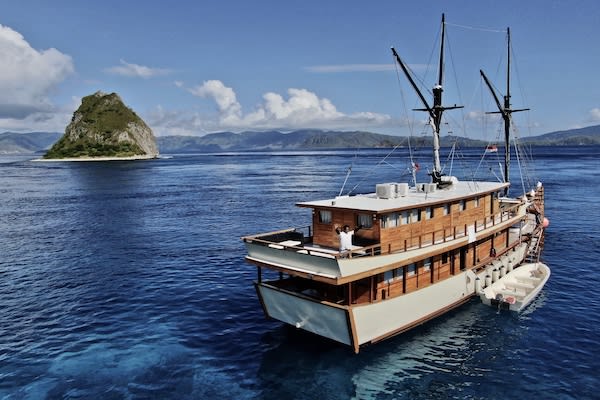
Muang Island, Gili Motang & Nusa Kode
Muang island (beach time)
Today, we will visit some of the remotest and least visited parts of Komodo National Park, in the east. We’ll start with the tiny uninhabited island of Muang, located between Rinca and Flores. This is a protected area and a turtle nesting place with a white sand beach, where you can relax. You won’t see any turtles coming ashore during the daytime, but you may find some turtle tracks in the sand. Keep your eyes peeled for Brahminy kites soaring overhead and white breasted sea eagles.
Gili Motang (snorkeling)
Located east of Rinca Island and distinguished by some large offshore satellite rocks and pristine reefs, Gili Motang offers beautiful scenery and some great snorkeling in the shallow waters. The island is home to a small population of about 100 Komodo dragons, although you’re unlikely to see them and there is no park ranger station here.
Nusa Kode (snorkeling)
We’ll finish the day snorkeling off Nusa Kode, which is an island to the south of Rinca. In fact, from here, you may even witness some dragons rambling along Rinca’s seashore. The southwestern tip of Nusa Kode island is characterized by large, coral-encrusted boulders and among these are some of the largest reef fish residing in the Park such as gigantic potato cod and Malabar groupers as well as schools of large red snapper.

Padar Island, Long Beach
Nusa Kode (snorkeling)
The marine life around Nusa Kode is so abundant that you’ll appreciate the additional time we’ve allocated to snorkeling here in the far reaches of the National Park.
Padar Island (trekking)
Padar is the third largest island within the Komodo National Park. It offers beautiful short treks and is a hotspot for photographers. The hike to the peak takes about 20-40 minutes, and from the viewpoint you will be rewarded with a knee-jerking vista of a series of crescent-shaped bays and curved ribbons of sand.
Long Beach [Pink Beach] (beach/snorkeling)
Long Beach on Padar Island is the longest of several pink beaches in the Komodo National Park. The striking pink sand is formed by white limestone mixed with tiny particles of deep red, coral-like foraminifera. This is a beautiful beach for relaxing, swimming and snorkeling.
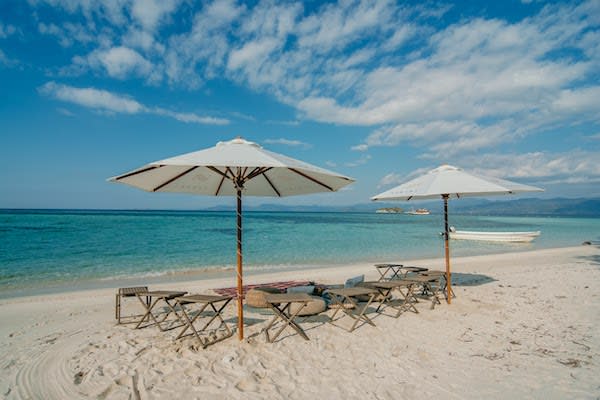
Manta Alley, Cape Letuhoh & Batu Moncong
Manta Alley (snorkeling)
Jump in at any point in Manta Alley and chances are that the giant manta rays will be feeding or cleaning. For the best experience, when the currents are running through the small channel, hold onto the side of the boat and look down while watching the mantas swoop and fly past you under the water in a natural cinematic display.
Cape Letuhoh (beach/snorkeling)
Relax on the beach at Cape Letuhoh, or snorkel on the reef, which is frequented by big potato cod, gray reef sharks, eagle rays, turtles, schools of rainbow runner, dogtooth tuna, giant trevally and snapper. There are also large coral-encrusted pinnacles here.
Loho Lajupemali island (beach time)
This small island is located off the west coast of Komodo Island and offers a delightful beach where you can relax and play.
Batu Moncong (snorkeling)
Characterized by deep walls and exposed seamounts, Batu Moncong is one of the least visited snorkeling sites on the boundary of the National Park, with epic sunset views of the active volcano, Gunung Api Sangean in the background.
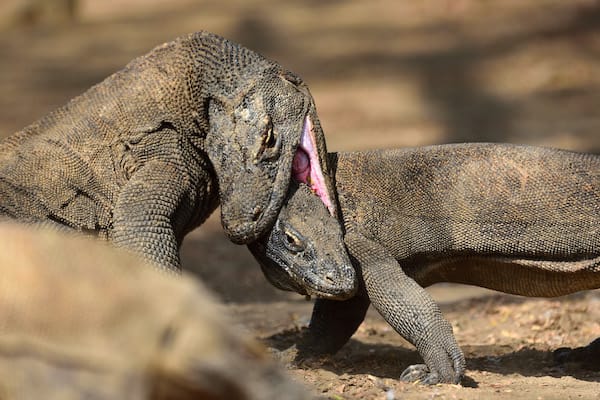
Gili Lawa Darat & Laut, Taka Makassar & Manta Point
Gili Lawa Darat & Laut
Gili Lawa Darat is the northernmost island in Komodo National Park. Here, you can spend the morning snorkeling and swimming in the tranquil, almost circular bay, a natural harbor. Hang out on the crescent-shaped beach and keep your eyes peeled for white-collared kingfishers on the shoreline, or Brahminy kites (also known as red-backed or white-headed sea eagles) soaring in the sky above. Behind you is a peak, 750 ft above sea level, it’s a 20-to-30-minute hike to the top where the horizon opens up to a complete vista overlooking all 80 islands within the Komodo Archipelago and the mainland of Flores. The sight of the long white sandy beaches with clearly visible coral formations, the savannah-like landscape of Komodo Island and volcanic island silhouettes in the background is a unique photo opportunity and will become a cherished memory. The neighboring sister-island of Gili Lawa Laut promises an equally breathtaking viewpoint and you can trek to the peak in about 30 minutes. Snorkeling is also sublime here.
Taka Makassar (beach time/snorkeling)
Taka Makassar is the longest reef in the Komodo National Park. This tiny, emerged, crescent shaped sandbar is smaller than a football field, and surrounded by shallow turquoise waters. It is an ideal spot for relaxing, snorkeling or simply taking a dip in the sea. Exploration here is limited due to the sandbar’s minuscule size – in fact, it disappears at high tide – but it makes for great wanderlust-inducing photographs. Plentiful marine life can be seen just 30 feet from the sandbar. The location attracts large numbers of manta rays.
Manta Point (snorkeling)
Manta Point presents the opportunity to snorkel with the giant manta rays that come here to get cleaned by parasitic copepods and a variety of small cleaner wrasse species, which pick parasites from the mantas’ hovering bodies. Mantas spend many hours every day getting cleaned and can even wait in line for their turn. Reef mantas average about 10 feet in size from wingtip to wingtip, and will consume vast quantities of plankton and small fish each day by filter feeding. They are exceptionally graceful swimmers, and appear to fly through the water as they flap their large wings. The water at Manta Point is clear with good visibility, making it possible to spot the mantas with relative ease. In fact, you are almost guaranteed to see them here. Drifting on the (often strong) current with your mask and snorkel, just a few feet above one of these beautiful creatures is an experience that you will never forget.
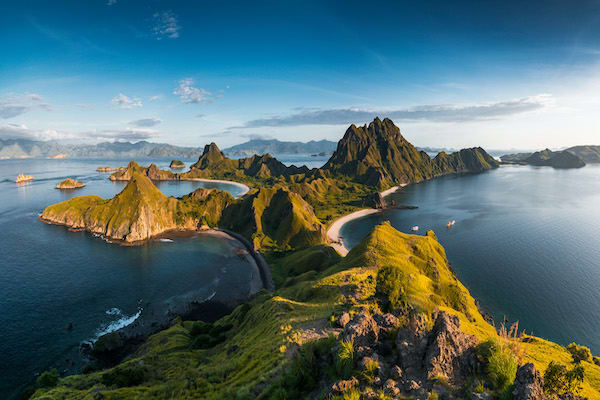
Siaba & Sebayur Besars
Siaba Besar Island (snorkeling)
Siaba Besar Island is Komodo’s best spot for turtles. A huge population of green turtles use this hard coral covered bay as a feeding ground. Snorkel here and more often than not, you’ll see the turtles scratching on corals and rubbing their shells on sponges to keep clean.
Sebayur Besar Island (snorkeling)
Sebayur Besar Island offers fantastic snorkeling with a reef full of life, including schools of bump head parrotfish and fusiliers, leaf scorpionfish and stonefish, morays, batfish, damselfish, butterflyfish, anthias, giant spiny lobster, cuttlefish, octopus, and electric clams.
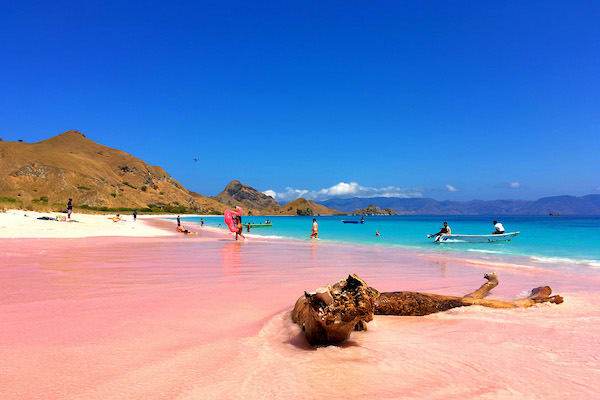
Kawana & Bidadari Islands
Kanawa Island (beach time/snorkeling)
Kanawa Island is known for its white sand beaches and coral reefs. Dolphins, stingrays, turtles and starfish, anemones, clown fishes and many other species can be seen on or nearby the reef. If you snorkel under the jetty, you may spot the resident lionfish; these guys are incredible to look at but be sure to stay clear of their venomous spines. You may also see a few baby black-tip sharks swimming close to the shore. Kanawa is a lovely place to relax on the beach and admire the view of Sangeang volcano.
Bidadari Island (beach time)
Bidadari (Angel) Island has three beaches and is surrounded by clear waters and a coral reef, which has been given a protected status, allowing the reef and marine life to thrive. The island is a haven for birds, butterflies and insects. Woodpeckers, kingfishers, sunbirds, Flores white eyes, megapodes, and sea eagles are all seen on a regular basis. The reef is home to spectacular soft and hard corals, seahorses, pufferfish, snake eels, moray eels, cuttlefish, nudibranch, pipefish and much, much more. Relax on the white sandy beach and you might be lucky enough to see a passing pod of dolphins or a jumping sailfish, look for baby reef sharks in the shallows and stingrays in the late afternoon.
*** The destinations on this itinerary may be subject to change depending on requests, beach lunch/dinner set up, flight timetables, weather, dry/rainy season, sea currents, and restrictions without prior notice from the National Park.
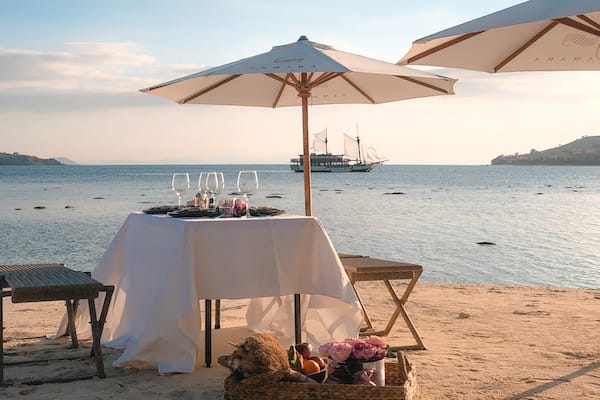
Kelor Island, Pink Rock & Kalong Island
Kelor Island (trekking)
Departing from Labuan Bajo, we will cruise to the tiny uninhabited island of Kelor. This is a perfect first-stop for a short 15-minute hike to the top of the hill, where you will be rewarded with a panoramic view of Flores, Rinca Island and many other small islands within the Komodo National Park. Please note that although it is a short hike, the route is rather steep with loose scree making it a bit slippery, so be sure to wear suitable shoes or hiking sandals. Afterwards you can cool off with a refreshing swim off the white sandy beach.
Menjerite/Pink Rock (Snorkeling/trekking)
Our second destination is Menjerite/Pink Rock, great for snorkeling or trekking. Menjerite Island is distinguished by a long wooden jetty that extends over its crystal-clear waters and colorful corals, like a bridge to paradise. Trek up the hill for a stunning view of the mangrove forest and surrounding islands, or snorkel in the shallow waters around the jetty, where you’ll find thousands of reef fish and many Chocolate Chip starfish.
Kalong Island (sunset on the boat)
At the end of the day, we will moor off Kalong Island, where after what will hopefully be a magnificent sunset, you will witness hundreds of thousands of flying foxes emerging in a steady throng from the forest, reminiscent of a fleet of enemy aircraft intent on avoiding radar detection. Unlike their smaller cave-dwelling cousins, these large fruit bats hang out in camps high above the rainforest floor, keeping cool by fanning themselves with their huge wings, which can measure up to 5ft 6 inches from tip to tip. They feed on a diet of fruit and nectar from night-opening flowers, thereby playing an essential ecological role by pollinating the plants and dispersing their seeds. As darkness grows near, the fox bats become increasingly restless, leaving the roost in enormous numbers, and navigating not by echolocation but by sight and smell, to fly to a feeding site on the mainland that may be as far as 25 miles away.
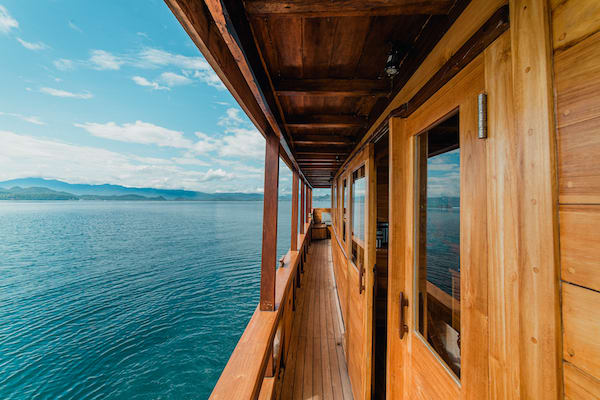
Muang Island, Gili Motang & Nusa Kode
Muang Island (beach time)
Today, we will visit some of the remotest and least visited parts of Komodo National Park, in the east. We’ll start with the tiny uninhabited island of Muang, located between Rinca and Flores. This is a protected area and a turtle nesting place with a white sand beach, where you can relax. You won’t see any turtles coming ashore during the daytime, but you may find some turtle tracks in the sand. Keep your eyes peeled for Brahminy kites soaring overhead and white breasted sea eagles.
Gili Motang (snorkeling)
Located east of Rinca Island and distinguished by some large offshore satellite rocks and pristine reefs, Gili Motang offers beautiful scenery and some great snorkeling in the shallow waters. The island is home to a small population of about 100 Komodo dragons, although you’re unlikely to see them and there is no park ranger station here.
Nusa Kode (snorkeling)
We’ll finish the day snorkeling off Nusa Kode, which is an island to the south of Rinca. In fact, from here, you may even witness some dragons rambling along Rinca’s seashore. The southwestern tip of Nusa Kode island is characterized by large, coral-encrusted boulders and among these are some of the largest reef fish residing in the Park such as gigantic potato cod and Malabar groupers as well as schools of large red snapper.
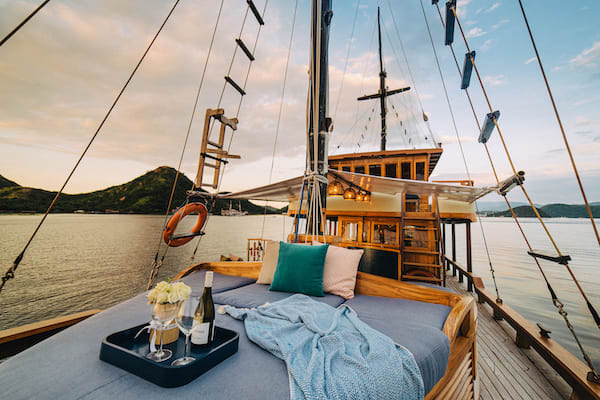
Padar Island, Long Beach
Nusa Kode (snorkeling)
The marine life around Nusa Kode is so abundant that you’ll appreciate the additional time we’ve allocated to snorkeling here in the far reaches of the National Park.
Padar Island (trekking)
Padar is the third largest island within the Komodo National Park. It offers beautiful short treks and is a hotspot for photographers. The hike to the peak takes about 20-40 minutes, and from the viewpoint you will be rewarded with a knee-jerking vista of a series of crescent shaped bays and curved ribbons of sand.
Long Beach [Pink Beach] (beach/snorkeling)
Long Beach on Padar Island is the longest of several pink beaches in the Komodo National Park. The striking pink sand is formed by white limestone mixed with tiny particles of deep red, coral-like foraminifera. This is a beautiful beach for relaxing, swimming and snorkeling.
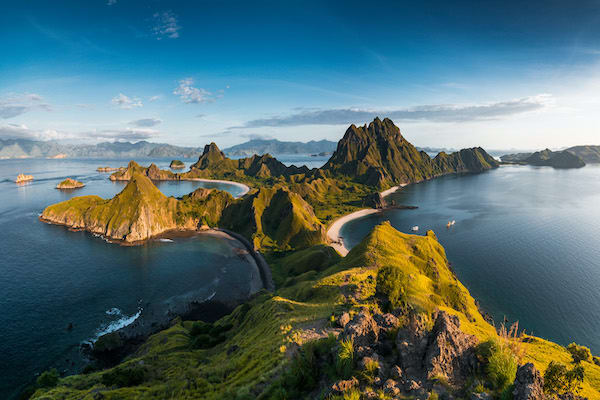
Manta Alley, Cape Letuhoh & Batu Moncong
Manta Alley (snorkeling)
Jump in at any point in Manta Alley and chances are that the giant manta rays will be feeding or cleaning. For the best experience, when the currents are running through the small channel, hold onto the side of the boat and look down while watching the mantas swoop and fly past you under the water in a natural cinematic display.
Cape Letuhoh (beach/snorkeling)
Relax on the beach at Cape Letuhoh, or snorkel on the reef, which is frequented by
big potato cod, gray reef sharks, eagle rays, turtles, schools of rainbow runner, dogtooth tuna, giant trevally and snapper. There are also large coral-encrusted pinnacles here.
Loho Lajupemali island (beach time)
This small island is located off the west coast of Komodo Island and offers a delightful beach where you can relax and play.
Batu Moncong (snorkeling)
Characterized by deep walls and exposed seamounts, Batu Moncong is one of the least visited snorkeling sites on the boundary of the National Park, with epic sunset views of the active volcano, Gunung Api Sangean in the background.
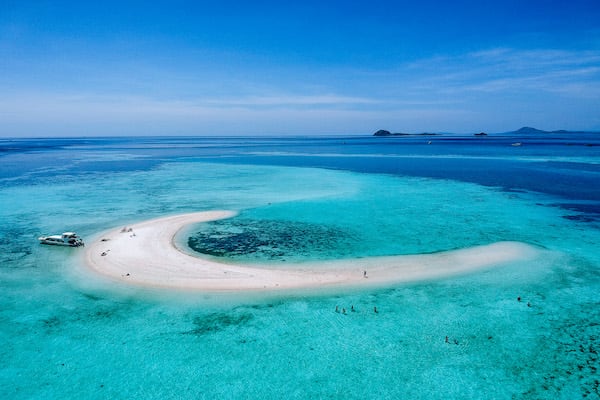
Gili Lawa Darat & Laut, Taka Makassar & Manta Point
Gili Lawa Darat & Laut
Gili Lawa Darat is the northernmost island in Komodo National Park. Here, you can spend the morning snorkeling and swimming in the tranquil, almost circular bay, a natural harbor. Hang out on the crescent-shaped beach and keep your eyes peeled for white-collared kingfishers on the shoreline, or Brahminy kites (also known as red-backed or white-headed sea eagles) soaring in the sky above. Behind you is a peak, 750 ft above sea level, it’s a 20-to-30-minute hike to the top where the horizon opens up to a complete vista overlooking all 80 islands within the Komodo Archipelago and the mainland of Flores. The sight of the long white sandy beaches with clearly visible coral formations, the savannah-like landscape of Komodo Island and volcanic island silhouettes in the background is a unique photo opportunity and will become a cherished memory. The neighboring sister-island of Gili Lawa Laut promises an equally breathtaking viewpoint and you can trek to the peak in about 30 minutes. Snorkeling is also sublime here.
Taka Makassar (beach time/snorkeling)
Taka Makassar is the longest reef in the Komodo National Park. This tiny, emerged, crescent shaped sandbar is smaller than a football field, and surrounded by shallow turquoise waters. It is an ideal spot for relaxing, snorkeling or simply taking a dip in the sea. Exploration here is limited due to the sandbar’s minuscule size – in fact, it disappears at high tide – but it makes for great wanderlust-inducing photographs. Plentiful marine life can be seen just 30 feet from the sandbar. The location attracts large numbers of manta rays.
Manta Point (snorkeling)
Manta Point presents the opportunity to snorkel with the giant manta rays that come here to get cleaned by parasitic copepods and a variety of small cleaner wrasse species, which pick parasites from the mantas’ hovering bodies. Mantas spend many hours every day getting cleaned and can even wait in line for their turn. Reef mantas average about 10 feet in size from wingtip to wingtip, and will consume vast quantities of plankton and small fish each day by filter feeding. They are exceptionally graceful swimmers, and appear to fly through the water as they flap their large wings. The water at Manta Point is clear with good visibility, making it possible to spot the mantas with relative ease. In fact, you are almost guaranteed to see them here. Drifting on the (often strong) current with your mask and snorkel, just a few feet above one of these beautiful creatures is an experience that you will never forget.
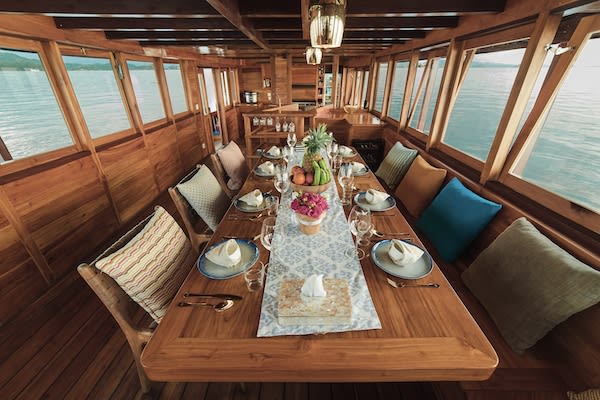
Mawan Island, Siaba & Sabayur Besars
Mawan Island (beach/snorkeling)
The small island of Mawan always offers pleasant and unexpected surprises. Hang out on the white beach and snorkel over a coral garden of such beauty that you’ll be left speechless. The hard and soft corals, small sea fans, colorful sponges and anemones here are the ideal habitat for nudibranchs, shrimps, crabs and small moray eels. Look for turtles, stingrays and manta rays, many of which are extremely intrigued by the presence of strange visitors and will approach to take a look.
Siaba Besar Island (snorkeling)
Siaba Besar Island is Komodo’s best spot for turtles. A huge population of green turtles use this hard coral covered bay as a feeding ground. Snorkel here and more often than not, you’ll see the turtles scratching on corals and rubbing their shells on sponges to keep clean.
Sebayur Besar Island (snorkeling)
Sebayur Besar Island offers fantastic snorkeling with a reef full of life, including schools of bump head parrotfish and fusiliers, leaf scorpionfish and stonefish, morays, batfish, damselfish, butterflyfish, anthias, giant spiny lobster, cuttlefish, octopus, and electric clams.
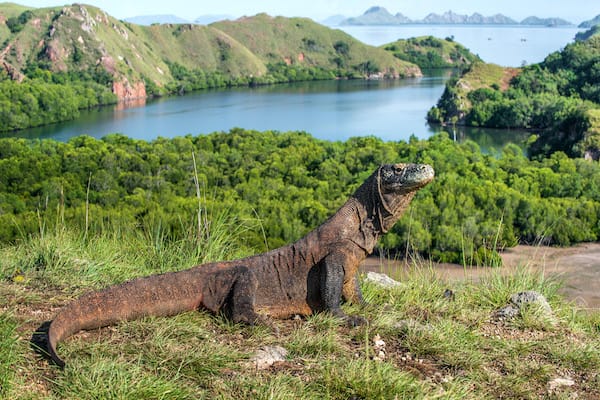
Kawana & Bidadari Islands
Kanawa Island (beach time/snorkeling)
Kanawa Island is known for its white sand beaches and coral reefs. Dolphins, stingrays, turtles and starfish, anemones, clown fishes and many other species can be seen on or nearby the reef. If you snorkel under the jetty, you may spot the resident lionfish; these guys are incredible to look at but be sure to stay clear of their venomous spines. You may also see a few baby black-tip sharks swimming close to the shore. Kanawa is a lovely place to relax on the beach and admire the view of Sangeang volcano.
Bidadari Island (beach time)
Bidadari (Angel) Island has three beaches and is surrounded by clear waters and a coral reef, which has been given a protected status, allowing the reef and marine life to thrive. The island is a haven for birds, butterflies and insects. Woodpeckers, kingfishers, sunbirds, Flores white eyes, megapodes, and sea eagles are all seen on a regular basis. The reef is home to spectacular soft and hard corals, seahorses, pufferfish, snake eels, moray eels, cuttlefish, nudibranch, pipefish and much, much more. Relax on the white sandy beach and you might be lucky enough to see a passing pod of dolphins or a jumping sailfish, look for baby reef sharks in the shallows and stingrays in the late afternoon.
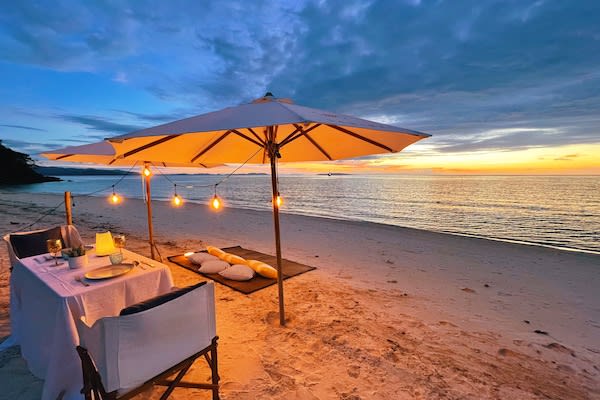
Hatamin & Rangko Cave
Hatamin island (beach/snorkeling)
The tiny uninhabited Hatamin Island is a coral sanctuary site that is managed by the not-for-profit organization Coral Guardian that preserves the coral reef ecosystem in the area. More than 130 tables of coral have been planted here featuring seven different species of coral. On the way to the island, you may see baby corals being re-planted in the sea banks. This island is very small and can be circled easily within minutes’ walk for a true experience of being stranded on a deserted island. The snorkeling here is excellent, the currents are calm and the corals are vibrant.
Rangko Cave (trekking, swimming)
Located not too far from Labuan Bajo, Rangko Cave is filled with fascinating stalactites and stalagmites as well as a vibrant blue natural pool. Start your journey with a trek to the cave, enjoy the scenery along the way, and explore this hidden gem. In the middle of the afternoon, the sun will hit the grotto creating a beautiful glow and a perfect photo opportunity. Cool off with a swim in the saltwater pool with the stalactites above you, but do be careful when entering and leaving the pool as it can be slippery. At the end of the day, make your way back to Rangko Village.
*** The destinations on this itinerary may be subject to change depending on requests, beach lunch/dinner set up, flight timetables, weather, dry/rainy season, sea currents, and restrictions without prior notice from the National Park.
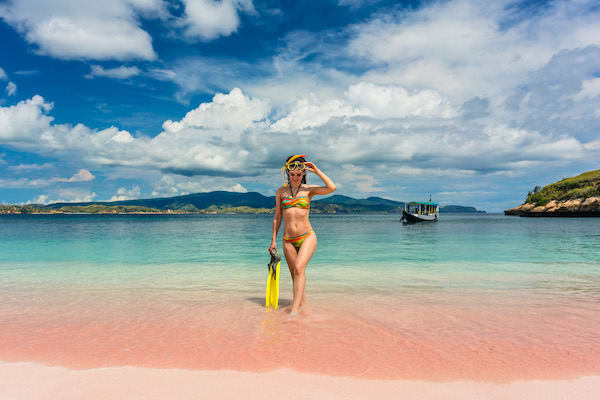
Accommodations
Social Areas
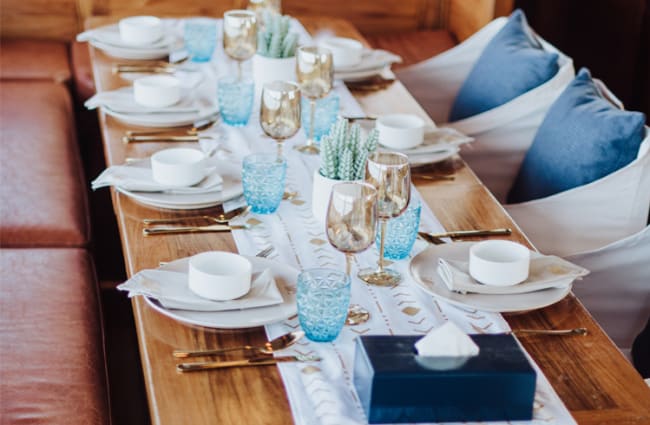
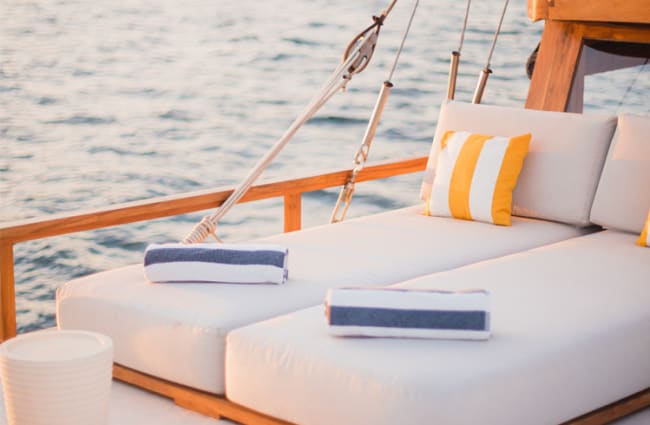
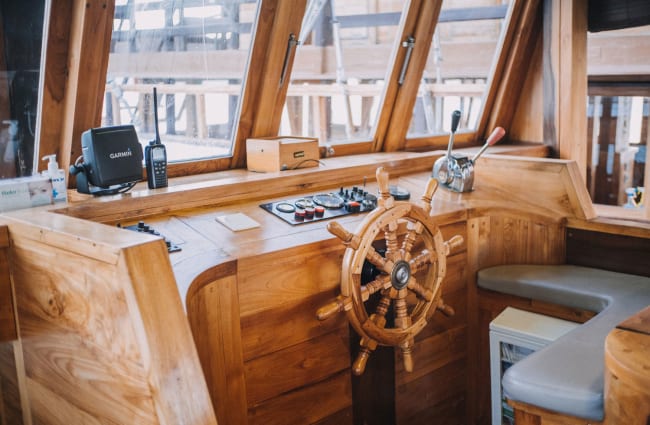
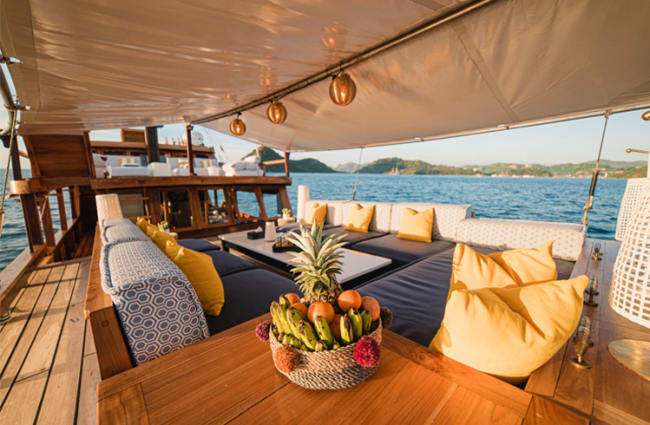
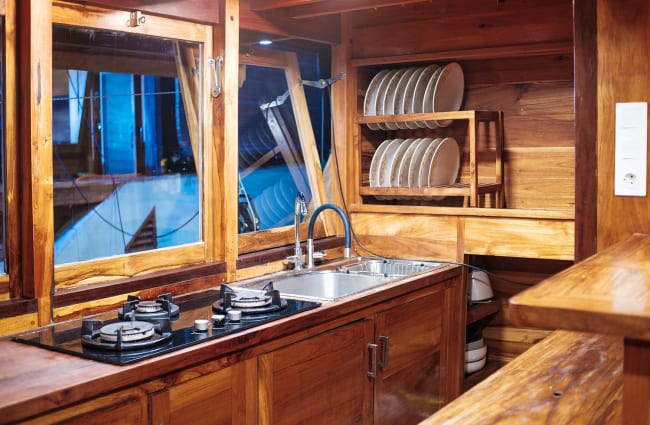
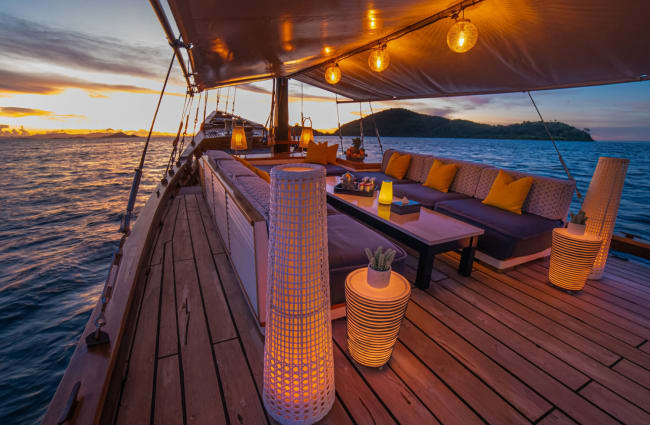
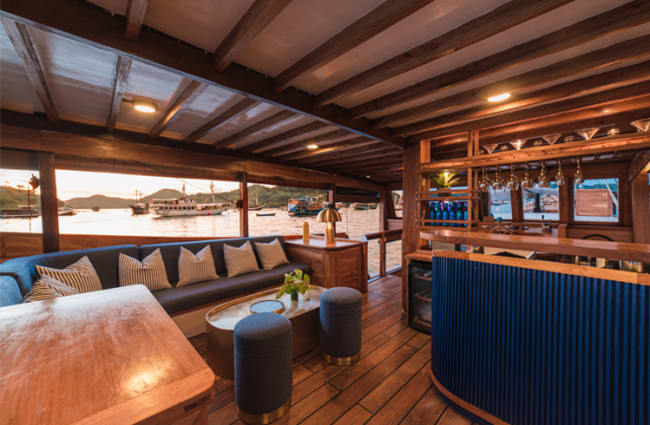
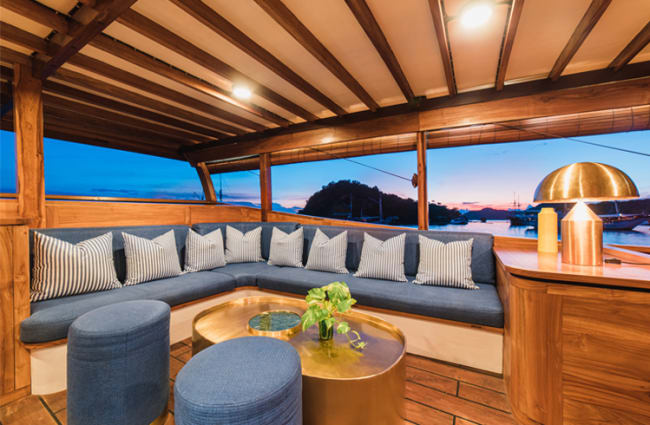
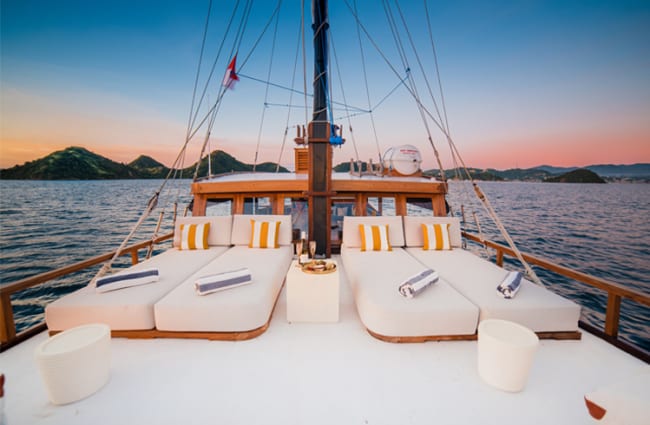
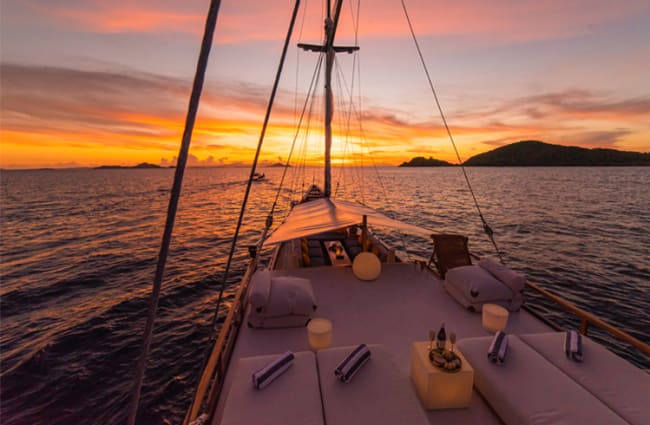
Suites & Cabins
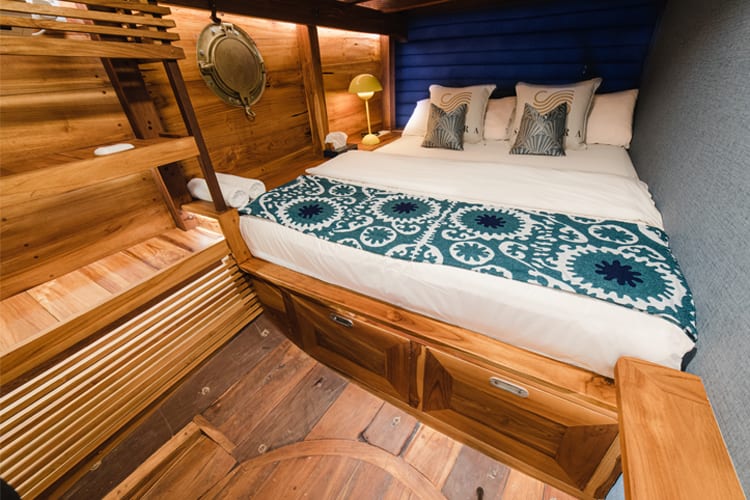
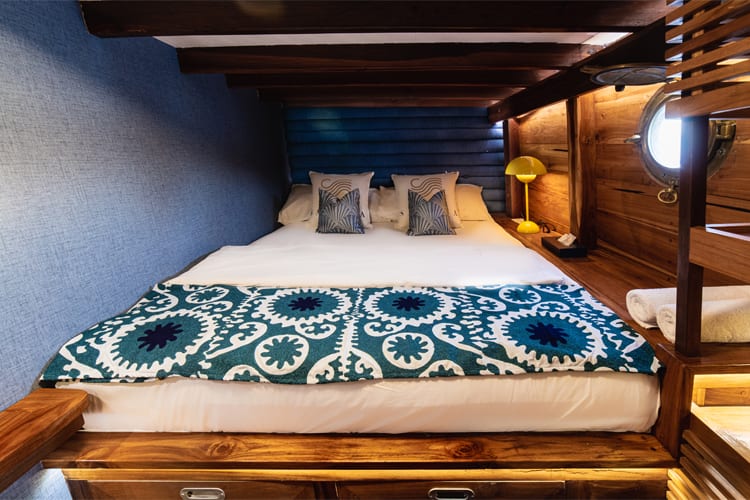
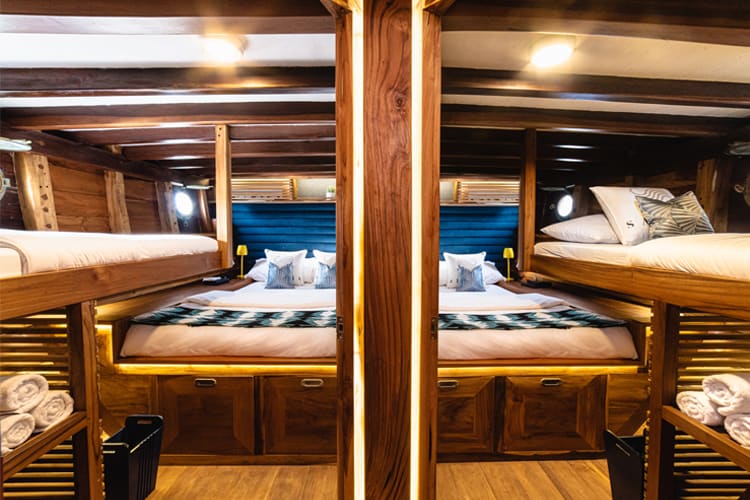
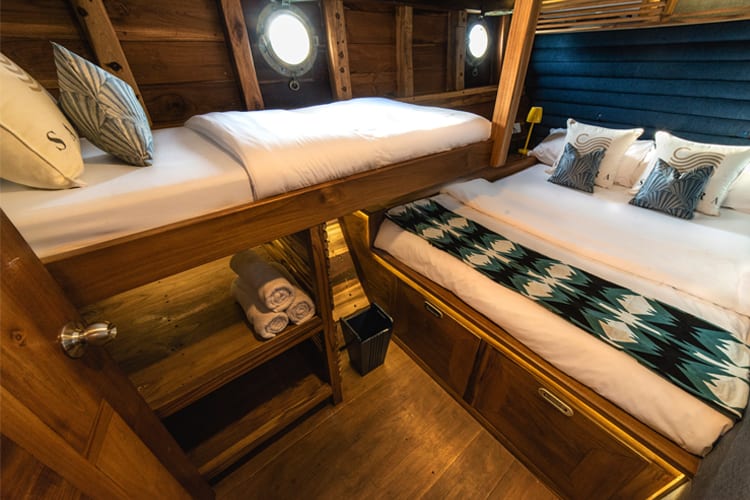
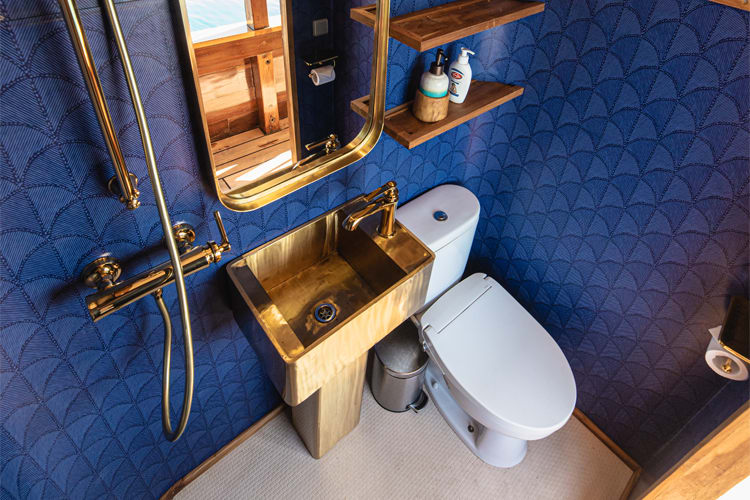
Standard Cabin
The stylish interiors of the boat draw in natural light, to create a bright, fresh and relaxing feel throughout the boat. On the lower deck are 4 air-conditioned cabins all with double beds, two of which have an extra bunk-style upper berth for triple occupancy. There are 2 well-appointed shared bathrooms on the main deck and all towels and linens are provided.
Related Cruises

- Indonesia
Moksha Pradana
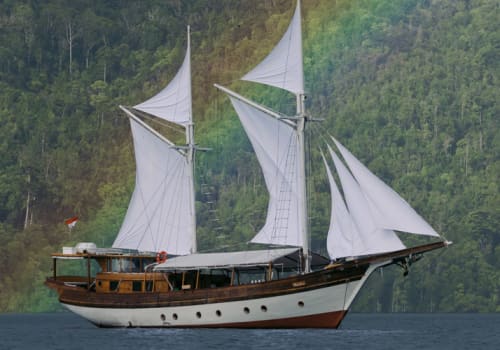
- Indonesia
Anne Bonny
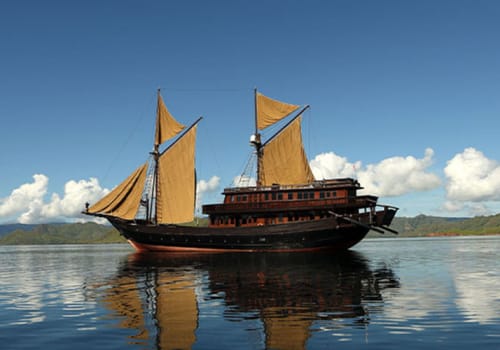
- Indonesia
Alila Purnama
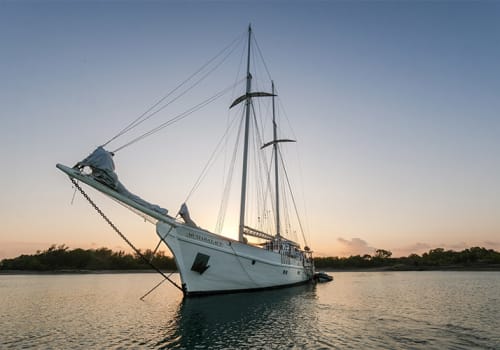
- Indonesia
Mutiara Laut
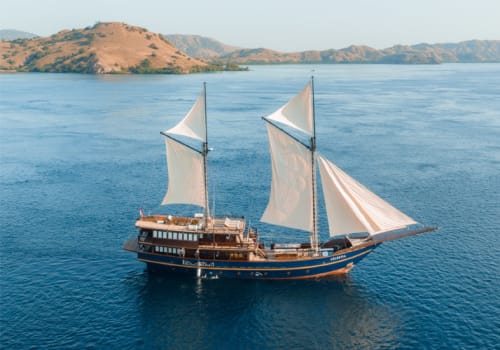
- Indonesia
Celestia Yacht
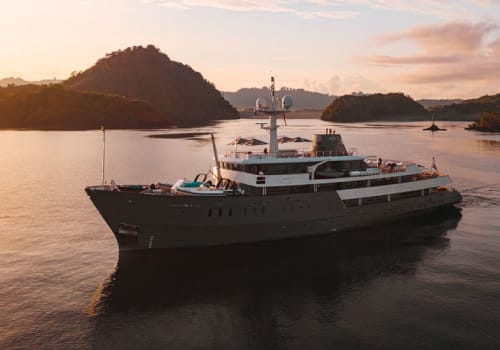
- Indonesia
Aqua Blu
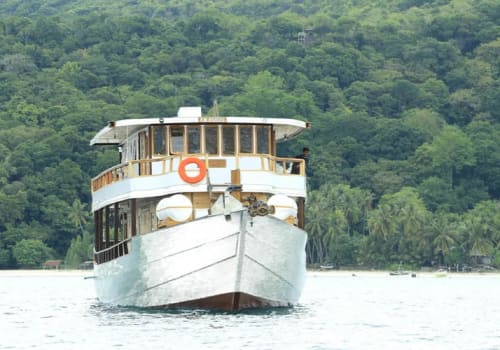
- Indonesia
Bajau
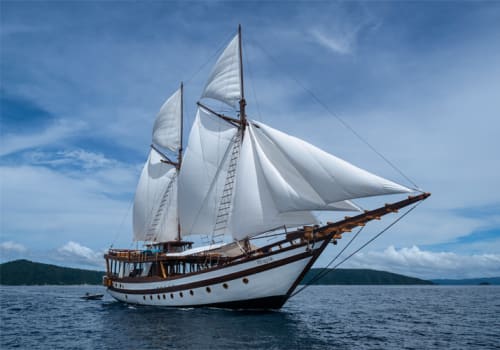
- Indonesia
Majik
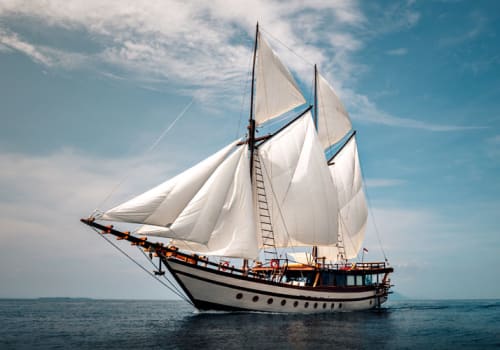
- Indonesia
Senja
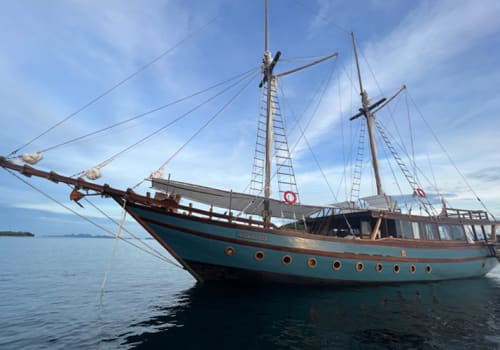
- Indonesia
Dewata
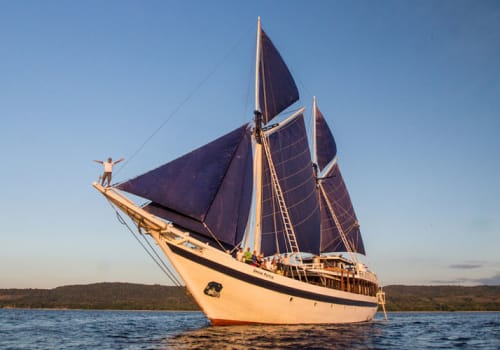
- Indonesia
Ombak Putih

- Indonesia
Sanctuary
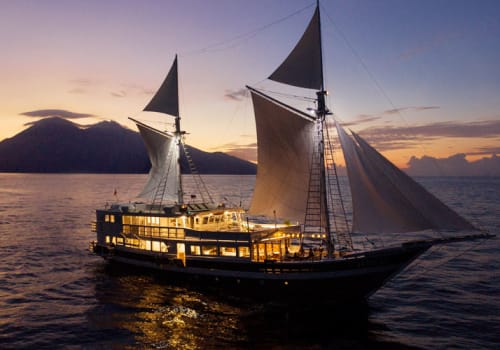
- Indonesia


